BREAKING: Arizona Senate passes repeal of 1864 abortion ban

Republicans block bill to protect women who travel to other states for abortions
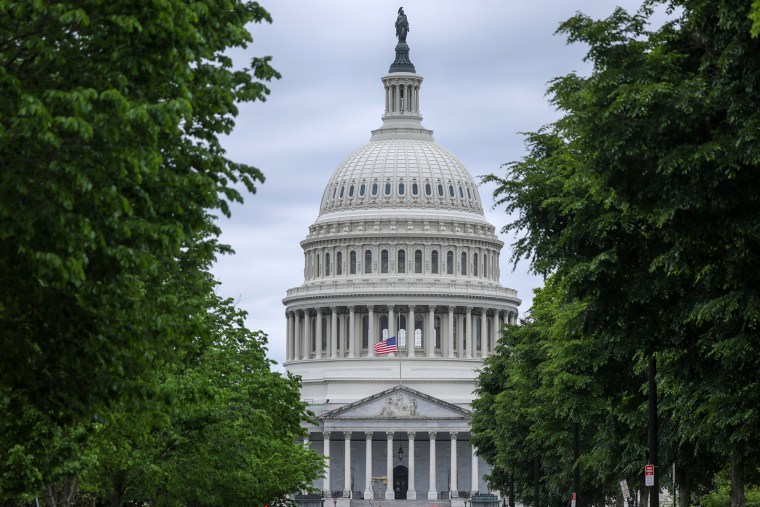
WASHINGTON — Senate Republicans blocked a Democratic bill Thursday that would protect the rights of women to travel to other states to access abortion care legally.
The author of the Freedom to Travel for Health Care Act , Sen. Catherine Cortez Masto of Nevada, requested consent to quickly pass the legislation but met resistance from Sen. James Lankford of Oklahoma, who objected on behalf of Republicans.
“There’s a child in this conversation, as well,” Lankford said on the Senate floor, accusing Democrats of seeking “to inflame — to raise the what-ifs.” He said proponents of the bill should ask themselves: “Does the child in the womb have the right to travel in their future?”
Sen. Steve Daines, R-Mont., called the legislation “radical” and warned against promoting "abortion tourism" by businesses.
Cortez Masto responded: “The issue here before us is exactly a states’ rights issue. ... All my legislation says is respect my state."
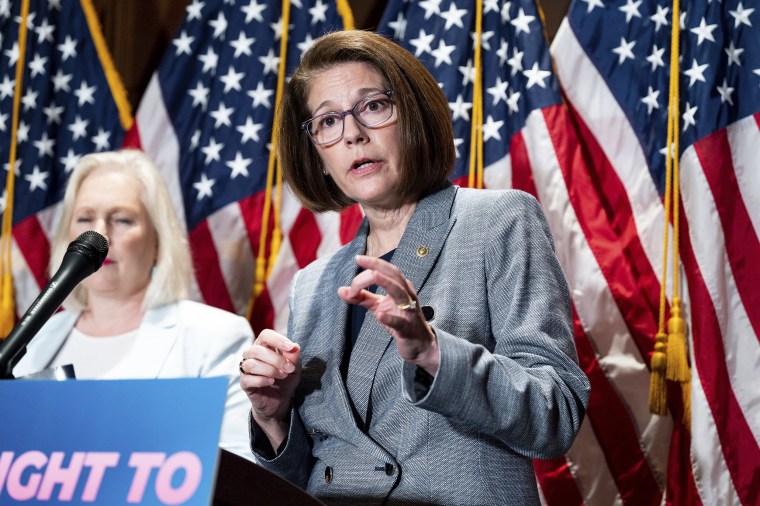
The eight-page bill would make it unlawful for a person or a government official to prevent or punish traveling across state lines "to receive or provide reproductive health care that is legal in that State." It also would bar states from imposing laws that prohibit women from traveling to other states to get abortions.
Cortez Masto said in a statement, “Anti-choice state legislators in Missouri, Texas, and Arkansas have said they want to pass bills to fine or prosecute women who travel for health care."
The House is poised to vote Friday on a similar bill, sponsored by Rep. Lizzie Fletcher, D-Texas, that would protect interstate travel for women seeking abortions where they are legal. The measure is expected to pass, but its prospects are uncertain in the Senate, where at least 10 Republican votes would be needed to defeat a filibuster.
Cortez Masto, who is one of the most politically vulnerable Democrats seeking re-election this fall, accused Republicans who oppose her bill of "allowing state legislators to reach across state lines to control not just what happens in their states, but what happens in every state across this country, and to punish women for exercising their fundamental rights."
"It’s absolutely outrageous," she said.
Despite the GOP objection to passing Cortez Masto's bill, Senate Republicans appear divided over whether women should retain the right to travel to get abortions. Some in the party argue that travel can’t or shouldn’t be restricted, although there was limited GOP interest in backing the Democratic bill.
"No state has the right to prohibit travel," Sen. Rand Paul, R-Ky., said in an interview, adding that the right stems from the Constitution and has been recognized by the Supreme Court.
Sen. Rick Scott, R-Fla., the chair of the Senate GOP campaign arm, said Wednesday he hadn't read the Democrats' bill but broadly believes Americans should be allowed to travel, including in circumstances like accessing legal abortion.
Sen. Mike Rounds, R-S.D., whose state has some of the most restrictive abortion laws in the country, said he is "pro-life" and doesn't expect the Senate to pass legislation on interstate travel.
"In this particular case, I think once the states have made their decisions, I think you’ll find that most of them will recognize that they can’t stop an individual from freely traveling from one state to another," he said.
Asked whether women should have the option to travel for abortions, Sen. Ted Cruz, R-Texas, told NBC News to contact his office, which didn't respond to a request for comment.
Sen. Josh Hawley, R-Mo., said he would reserve judgment until he studies Supreme Court precedent on interstate travel.
The issue has become a rallying cry for numerous Democrats after the Supreme Court overturned Roe v. Wade last month, paving the way for states to outlaw abortion.
Republicans considering interstate travel restrictions "want to hold women captive in their own states," said Sen. Patty Murray, D-Wash., a co-sponsor of Cortez Masto's bill. "They want to punish women and anyone who might help them for exercising their constitutional right to travel within our country, to get the services that they need in another state. I hope everyone really observes how extreme and how radical and how un-American that is.”
Sen. Tim Kaine, D-Va., said Cortez Masto is surveying Republicans to see whether her bill can win the 60 Senate votes needed to defeat a filibuster. He said Democrats might bring it up for a roll call vote to put all Republicans on the record.
“There might be some Republican votes on that," he said.
The issue has gotten elevated attention after a man was arrested on charges of raping a 10-year-old girl, who became pregnant and was reported to have traveled from Ohio to Indiana to get an abortion.
Kaine said there could be more instances like that.
"With the news about the sad reality of this 10-year-old having to be hustled across state lines so that she could get an abortion for being raped, I mean, they're going to go after the people who are helping kids like her?" he said.
Democrats hope the issue galvanizes voters ahead of what is shaping up to be a tough midterm election this fall for the party in power. While Republicans have sought to paint Democrats who oppose any limits on abortion as outside the mainstream, objections to interstate travel could backfire politically on the GOP .
"We're seeing this has dramatically affected the polls in a number of our races," Kaine said. "My gut would tell me this is a little bit more potent in a midterm than in a presidential" election.
Sahil Kapur is a senior national political reporter for NBC News.
Frank Thorp V is a producer and off-air reporter covering Congress for NBC News, managing coverage of the Senate.
Julie Tsirkin is a correspondent covering Capitol Hill.

- CRIMINAL JUSTICE + POLICING
- ENERGY + ENVIRONMENT
- GOV + POLITICS
U.S. House passes bills to ensure nationwide abortion access, interstate travel
By: jennifer shutt - july 16, 2022 12:02 am.

The U.S. Capitol in Washington, D.C., on Saturday, March 26, 2022 (Photo by Marisa Demarco / Source New Mexico)
WASHINGTON — The U.S. House passed legislation Friday that would reinstate access to abortion, though it’s highly unlikely the two bills approved on mostly party-line votes — or more that will come in the weeks ahead — would clear the 50-50 Senate.
One measure that House members engaged in passionate debate over Friday would make it clear that patients seeking abortions can travel without penalty to states where it’s legal, if the procedure is banned or heavily restricted in their home states.
Another bill would reinstate a nationwide right to an abortion, rejecting a U.S. Supreme Court ruling in June that overturned the landmark Roe v. Wade decision.
The bill to protect patients’ rights to travel for abortion services passed 223-205, with 220 Democrats and three Republicans voting in favor. The Republicans were Brian Fitzpatrick of Pennsylvania, Fred Upton of Michigan and Adam Kinzinger of Illinois.
The legislation legalizing abortion nationwide passed 219-210 , with no Republicans voting in favor. Texas Democratic Rep. Henry Cuellar voted against the legalization bill. In both votes, Virginia’s delegation split on party lines, with all seven Democrats voting yes and the state’s four Republican congressmen voting no.
I JUST voted to protect the right to interstate travel for women seeking lawful abortions. Since SCOTUS overturned Roe v. Wade, some states are working to restrict their residents from traveling to seek care — an absolute overstep of a state’s jurisdiction over its own laws. pic.twitter.com/EXjhwO8DJo — Rep. Abigail Spanberger (@RepSpanberger) July 15, 2022
Pediatrician speaks out
Washington Democratic Rep. Kim Schrier, a pediatrician, advocated for passage, saying that Republican abortion policies that don’t include exceptions for rape or incest are barbaric.
“I have been in the exam room with teens facing unplanned pregnancies and with mothers who find out the pregnancy they are so excited about is not a viable one,” Schrier said during floor debate.
“The right to choose should be made between a woman, her health care provider, and her faith—the government should have no place in this deeply personal decision. I urge my colleagues in the Senate to advance these protections to the president for his signature,” said U.S. Rep. Elaine Luria, D-Norfolk.
Today, I voted to advance two pieces of legislation to protect and defend women’s reproductive freedom and the right to choose after the U.S. Supreme Court overturned Roe v. Wade in June. https://t.co/M6KKZrZatR — Rep. Elaine Luria (@RepElaineLuria) July 15, 2022
But Rep. Cathy McMorris Rodgers, a Washington state Republican who led the GOP side, urged a vote against the nationwide abortion bill, saying it would permit abortions at any stage of pregnancy and would fail to bar termination of a pregnancy for specific reasons, such as gender or race.
“No one has the right to end the life of an innocent human being,” said U.S. Rep. Ben Cline, R-Botetourt.
All life is precious and must be protected. The Democrats’ extreme, hyper-partisan legislation would allow for abortions of unborn children for any reason and at any stage of pregnancy up until birth. pic.twitter.com/Rmz3H4Zyhn — Congressman Ben Cline (@RepBenCline) July 15, 2022
During 2020, there were 930,160 abortions performed in the United States, according to the Guttmacher Institute. The vast majority of those abortions, according to the Centers for Disease Control and Prevention, take place during the first trimester.
During 2019, CDC data shows that 93 percent of abortions took place before the 13th week of pregnancy, or the first trimester. Six percent of abortions took place between 14 and 20 weeks of gestation, before the fetus is viable. The remaining 1 percent of abortions took place after 21 weeks of pregnancy, according to analysis by the Pew Research Center.
Patients who receive abortions later in pregnancy often do so because of “medical concerns such as fetal anomalies or maternal life endangerment, as well as barriers to care that cause delays in obtaining an abortion,” according to an analysis by the Kaiser Family Foundation.
Supreme Court decision
U.S. Rep. Bobby Scott, D-Newport News, said the U.S. Supreme Court’s decision last month to undo the constitutional right it established in the 1973 Roe v. Wade case “fulfilled the GOP’s longtime goal of destroying reproductive health freedoms.” Now, he added, they want to “criminalize women’s health decisions.”
With the Dobbs ruling, SCOTUS erased 50 years of precedent & fulfilled the GOP’s longtime goal of destroying reproductive health freedoms & now they want to criminalize women’s health decisions. I voted to defend freedom & women’s right to make decisions about their health care. https://t.co/ZzpGxcgD2t — Rep. Bobby Scott (@BobbyScott) July 15, 2022
Debate over the right-to-travel bill was also along party lines.
Majority Leader Steny Hoyer, a Maryland Democrat, said Republicans in state legislatures discussing travel bans could lead to “draconian, authoritarian laws.”
“I’m old enough to remember when it wasn’t legal and when people died in back alleys after going to charlatans, not having proper medical care,” Hoyer said. “Let’s not return to those dark and tragic days.”
California Democratic Rep. Jackie Speier said the abortion travel bill is necessary because the Supreme Court could also undo the constitutional right to travel it recognized under the Fifth Amendment .
“Interestingly enough, the right to travel, those words, are not in the Fifth Amendment,” Speier said. “So if we have an originalist court, we do have to pass this bill … because women should be able to travel. And right now we cannot even guarantee that to a woman who wants to get an abortion.”
The House also passed the Ensuring Women’s Right to Reproductive Freedom Act, which would protect the right to travel across state lines for reproductive care — a right already under attack in states like Indiana. I voted YES; this was the final vote count: pic.twitter.com/ZmyMirtMO8 — Rep. Don Beyer (@RepDonBeyer) July 15, 2022
The Supreme Court’s opinion in the Kent v. Dulles case in 1958 determined “the right to travel is a part of the ‘liberty’ of which a citizen cannot be deprived without due process of law under the Fifth Amendment.”
Florida Republican Rep. Kat Cammack argued Democrats’ concerns about state laws that may restrict travel and Democratic lawmakers’ questions about how exactly state governments would enforce those laws were absurd.
“The notion that women will somehow be stopped at checkpoints is insane,” Cammack said.
Senate outlook
It’s unlikely either bill the House passed Friday will clear the evenly divided U.S. Senate, where at least 10 Republicans would need to vote to move past the legislative filibuster.
The travel bill, referred to as the Ensuring Access to Abortion Act of 2022, would prevent states, or people empowered by states’ laws, from interfering with abortion providers in legal states, people traveling to those states, or people helping people travel to access abortion.
The U.S. attorney general or anyone harmed by a violation of the travel bill would be allowed to bring a civil case in U.S. district court.
The Women’s Health Protection Act of 2022 would reinstate nationwide abortion access, permitting health care clinics in deeply red states that have banned or heavily restricted the procedure since the Supreme Court’s ruling.
The legislation would prevent federal and state governments from implementing restrictions that aren’t medically necessary.
It would also prevent those governments from distributing medically inaccurate information about abortions, limiting telemedicine for abortions, restricting medication abortion and requiring patients to make medically unnecessary in-person visits.
Governments would be barred from restricting abortions ahead of viability, the threshold the Supreme Court set in the 1992 Planned Parenthood v. Casey case when the court also reaffirmed the nationwide, constitutional right to an abortion. Fetal viability, or the ability to survive outside the womb, usually occurs around 22 to 24 weeks into a pregnancy.
Governments couldn’t set restrictions on abortion after viability when “in the good-faith medical judgment of the treating health care provider, continuation of the pregnancy would pose a risk to the pregnant patient’s life or health.”
The House previously approved another version of the Women’s Health Protection Act on a 218 – 211 vote last September. The Senate tried to pass a similar bill , but was unable to get the votes needed to surmount the legislative filibuster following a 49 – 51 procedural vote in May.
Both bills would have protected abortion access throughout the country.
Contraception vote next
The U.S. House votes Friday weren’t the last stemming from the Supreme Court’s decision on abortion.
The chamber is slated to vote next week on a bill that would ensure access to contraception nationwide, in response to concerns the conservative justices may undo other constitutional rights based in the 14th Amendment’s due process clause.
Associate Justice Clarence Thomas wrote in his opinion for the abortion case, Dobbs v. Jackson Women’s Health Organization, that the Supreme Court should reconsider three prior cases that were based on the same legal logic as the constitutional right to an abortion.
Those three separate rulings recognized a constitutional right to determine if and how to use contraception, prevented government interference in consensual adult private sexual relationships and legalized same-sex marriage.
Hoyer said Friday when announcing the vote next week on contraceptive access that “American women deserve to be able to make decisions about their own bodies and their own lives, including whether to become pregnant and have children.”
“That is a basic human right that House Democrats will defend with all our strength,” Hoyer continued.
Our stories may be republished online or in print under Creative Commons license CC BY-NC-ND 4.0. We ask that you edit only for style or to shorten, provide proper attribution and link to our website. AP and Getty images may not be republished. Please see our republishing guidelines for use of any other photos and graphics.

Jennifer Shutt
Jennifer covers the nation’s capital as a senior reporter for States Newsroom. Her coverage areas include congressional policy, politics and legal challenges with a focus on health care, unemployment, housing and aid to families.
Virginia Mercury is part of States Newsroom , the nation’s largest state-focused nonprofit news organization.
Related News

- International

Nationwide campus protests

What's moving markets today
June 24, 2022 Roe v. Wade news
By Adrienne Vogt , Aditi Sangal , Elise Hammond, Meg Wagner and Veronica Rocha , CNN
Biden vows to protect women's rights to travel and have access to medications and contraception
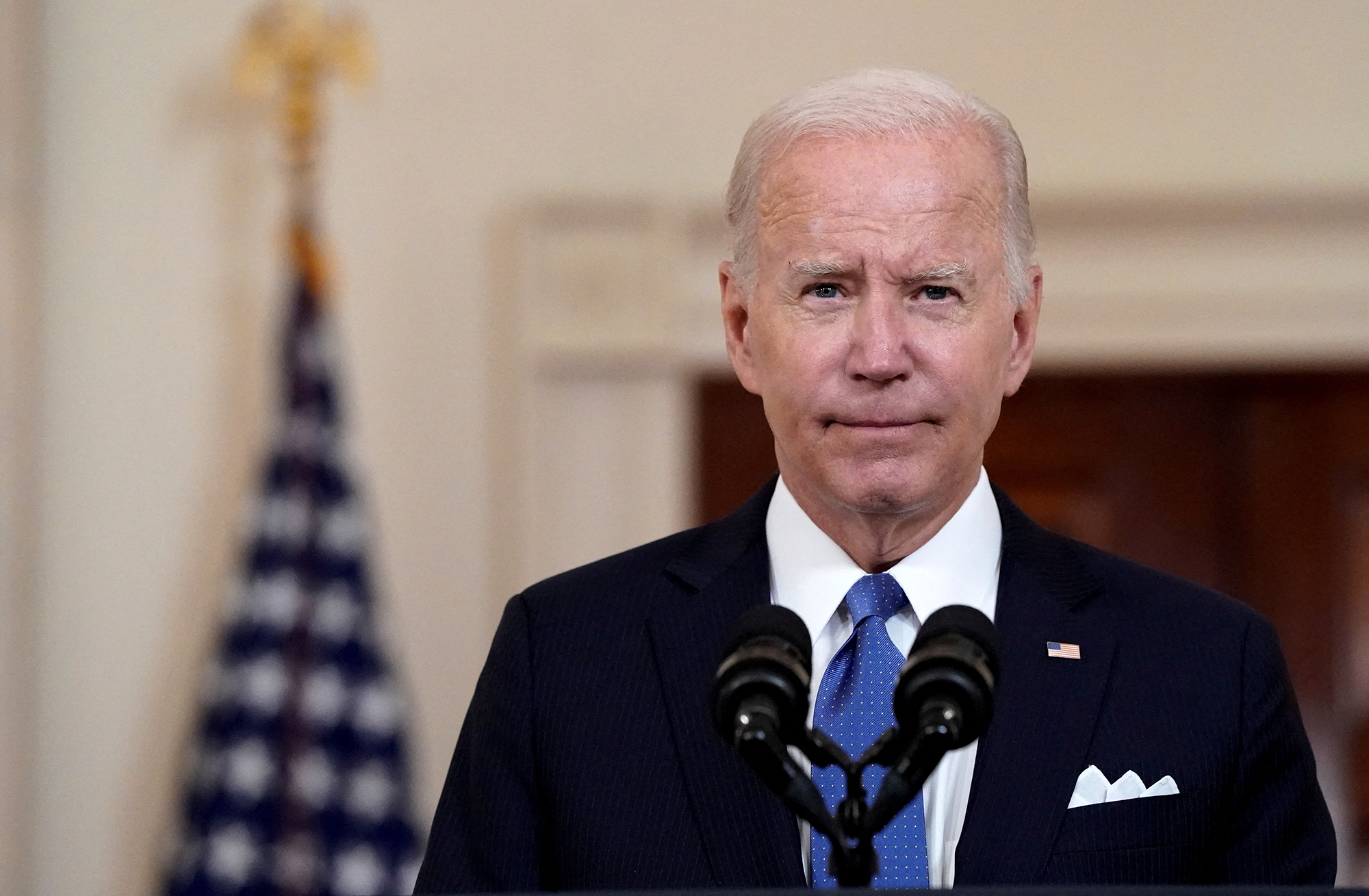
President Biden said his administration will protect the "bedrock right" of women to travel from states that ban abortion to those that allow it, also pledging to protect women's access to medications.
"So a woman lives in a state that restricts abortion, the Supreme Court's decision does not prevent her from traveling from her home state to the state that allows it. It does not prevent a doctor in that state from treating her. As the attorney general has made clear, women must remain free to travel safely to another state to seek care they need," he said.
"If any state or local official — high or low — tries to interfere with a woman exercising her basic right to travel, I will do everything in my power to fight that deeply un-American attack," he added.
He also vowed to protect women's access to medications approved by the FDA and contraception.
Some states are saying that "they'll try to ban or severely restrict access to these medications," Biden said, adding that "extremist governors and state legislators are looking to block the mail or search a person's medicine cabinet" are "wrong and extreme and out of touch with the majority of Americans."
Biden said health organizations have said that "by limiting access to these medicines, maternal mortality will climb in America."
He adde the Department of Health and Human Services will ensure medications are available "to the fullest extent possible."
Biden: The Supreme Court ruling is "literally taking America back 150 years"
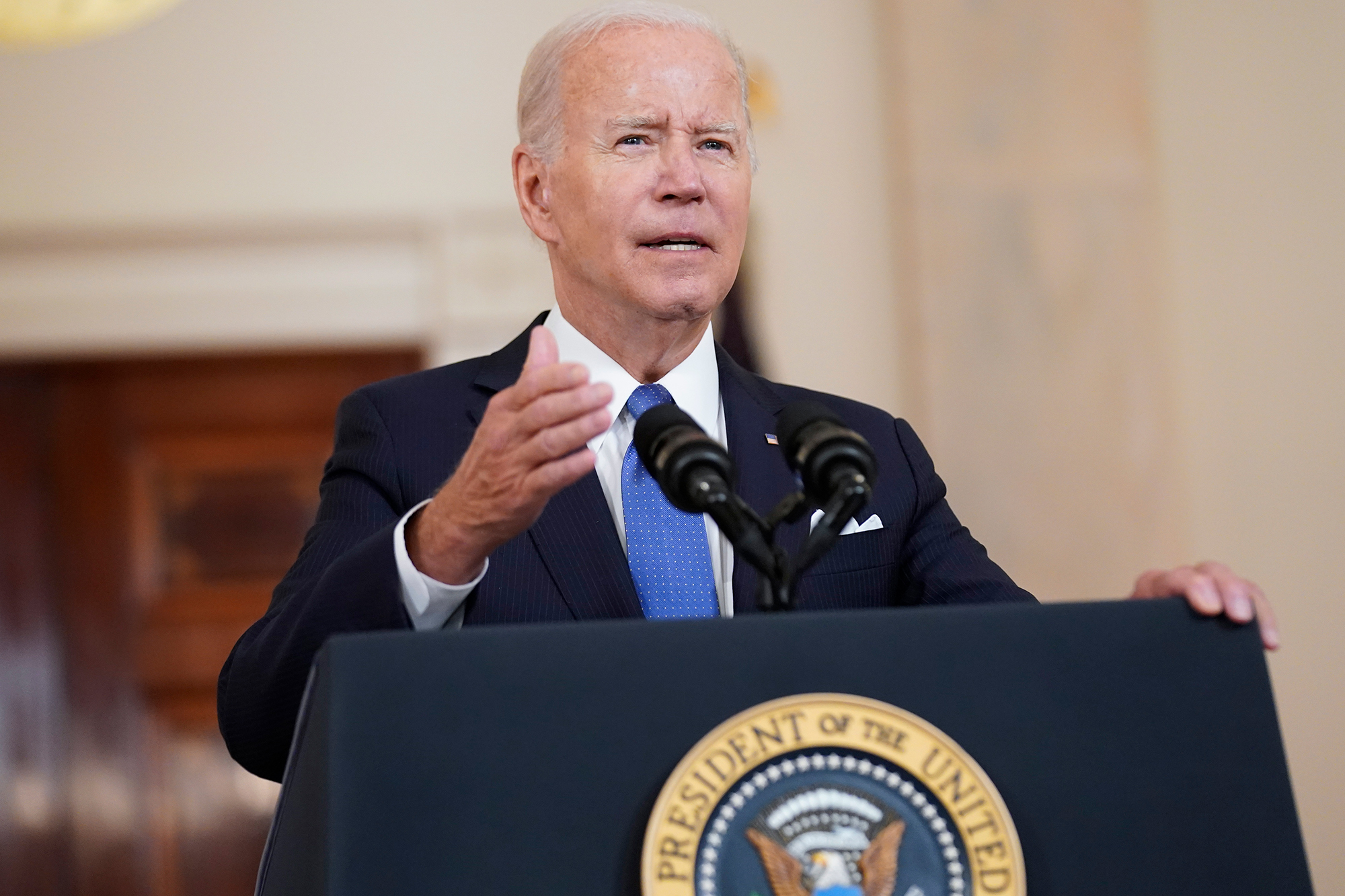
Friday's Supreme Court ruling that overturns Roe v. Wade is "literally taking America back 150 years," said President Biden.
Biden looked ahead to the elections in November and said voters must vote for representatives who will restore abortion rights.
"Let me be very clear and unambiguous. The only way we can secure a woman's right to choose ... is for Congress to restore the protections of Roe v. Wade as federal law. No executive action from the President can do that," he said.
"And if Congress, as it appears, lacks the votes to do that now, voters need to make their voices heard. This fall, you must elect more senators and representatives who will codify a woman's right to choose into federal law once again," Biden added.
"This fall, Roe is on the ballot. Personal freedoms are on the ballot. The right to privacy, liberty, equality — they're all on the ballot. Until then, I will do all in my power to protect a woman's right in states where they will face the consequences of today's decision," he said in his address.
Overturning Roe v. Wade puts "the health and life of women" at risk, Biden says
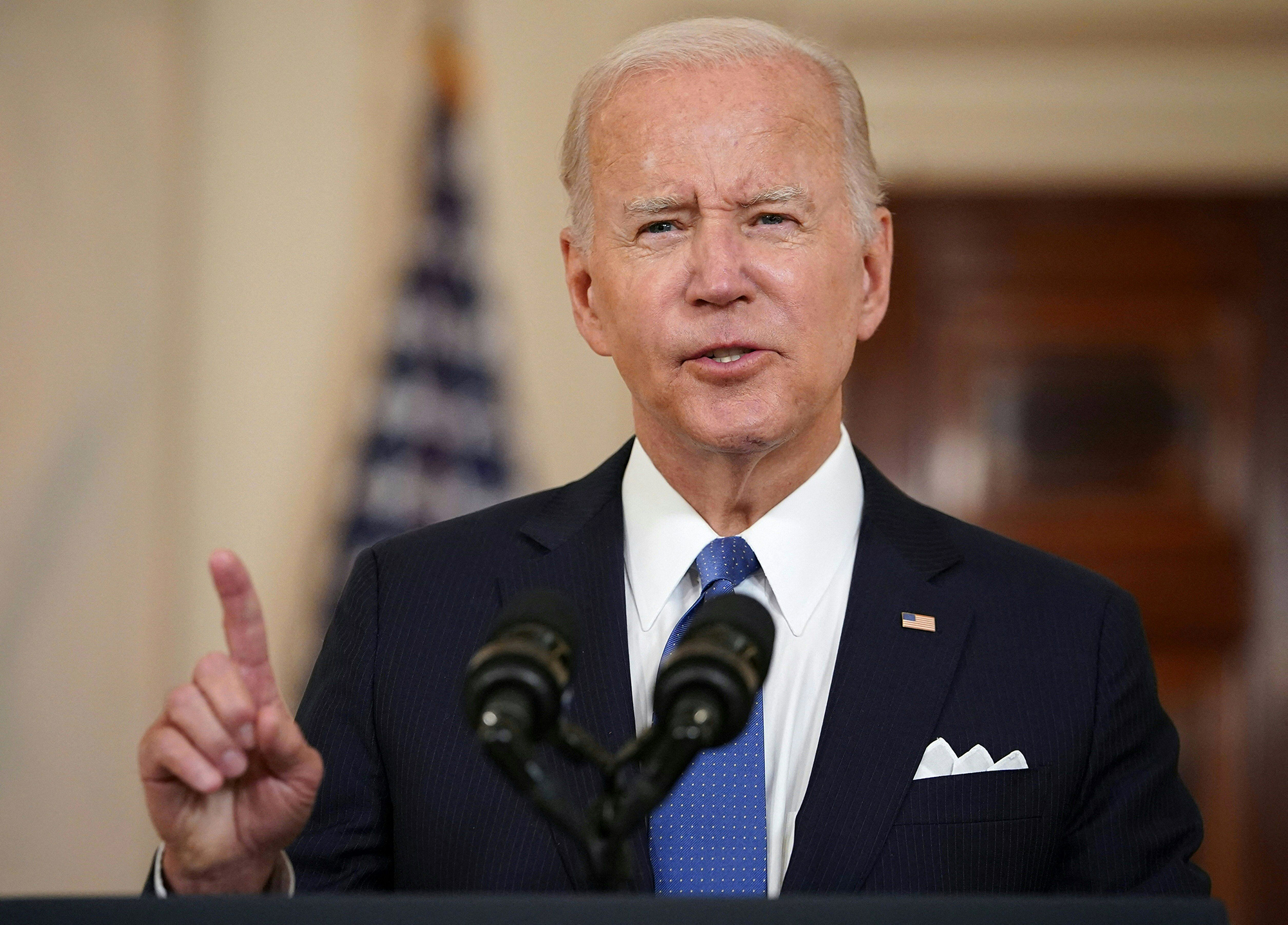
President Biden said the Supreme Court's decision to overturn Roe v. Wade marks a "sad day for the court and for the country."
"Today the Supreme Court of the United States expressly took away the Constitutional right from the American people that they already recognized. They didn't limit it. They simply took it away. That's never been done to a right so important to so many Americans, but they did it," Biden said.
Biden said with the Constitutional protection gone, "the health and life of women in this nation are now at risk."
The President said as the vice president and now as President, he has studied this case carefully to inform decisions about who to nominate to sit on the Supreme Court.
"I believe Roe v. Wade was the correct decision," he said.
Biden says SCOTUS decision overturning Roe v. Wade is "a realization of an extreme ideology"
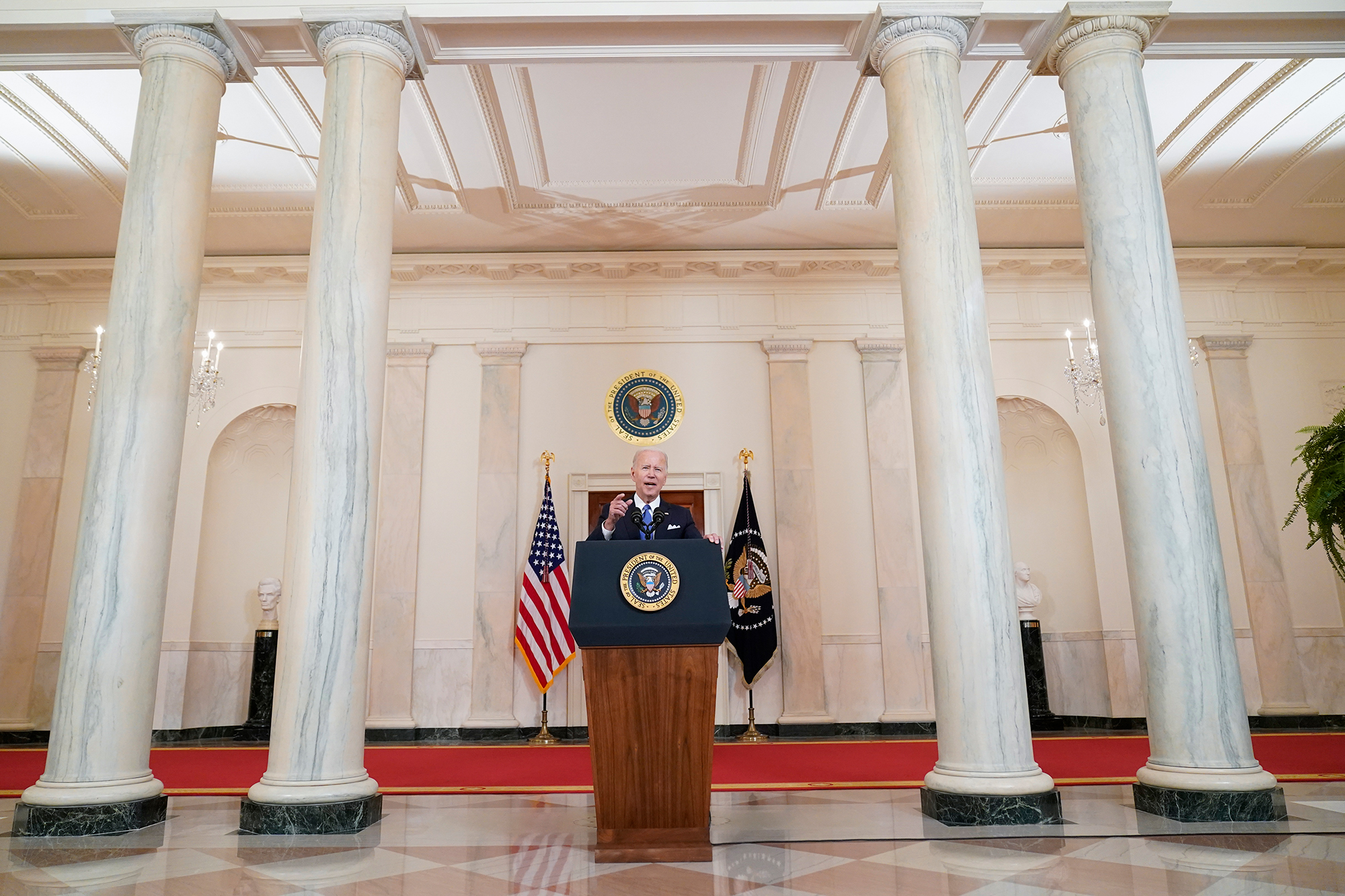
President Biden, speaking after the Supreme Court's decision to overturn Roe v. Wade, placed the ruling on the three justices named by former President Trump, adding that "it's a realization of an extreme ideology."
"It was three justices named by one president, Donald Trump, who were the core of today's decision to upend the scales of justice and eliminate a fundamental right for women in this country. Make no mistake, this decision is a culmination of a deliberate effort over decades to upset the balance of our law," Biden said.
"The court has done what it's never done before, expressly take away a constitutional right that is so fundamental to so many Americans that had already been recognized. The court's decision to do so will have real and immediate consequences," he said.
White House details action on call with stakeholders following Roe v. Wade ruling
From CNN's Betsy Klein
The White House joined a call following the Supreme Court's ruling on Roe v. Wade Friday with key stakeholders, a source familiar with the call tells CNN, previewing forthcoming announcements on administrative actions on women's reproductive health.
The Biden administration is expected to make three announcements, the source said, made by President Biden, Vice President Kamala Harris, and Attorney General Merrick Garland. The administration will enforce protection for medication-induced abortion and the Department of Health and Human Services will increase access to those medications. Women will have the right to travel to other states for abortion care and the Department of Justice will protect them if they choose to do so. And the Justice Department will also protect providers to advise women on abortions.
The President is also expected to call on Americans to elect candidates who support abortion rights and to call on Congress to codify the protections in Roe.
Representatives from NARAL, Planned Parenthood and Emily's List were among those on the call.
"It's a sad day for the court and for the country": Biden delivers remarks on Roe v. Wade ruling
From CNN's Kate Sullivan
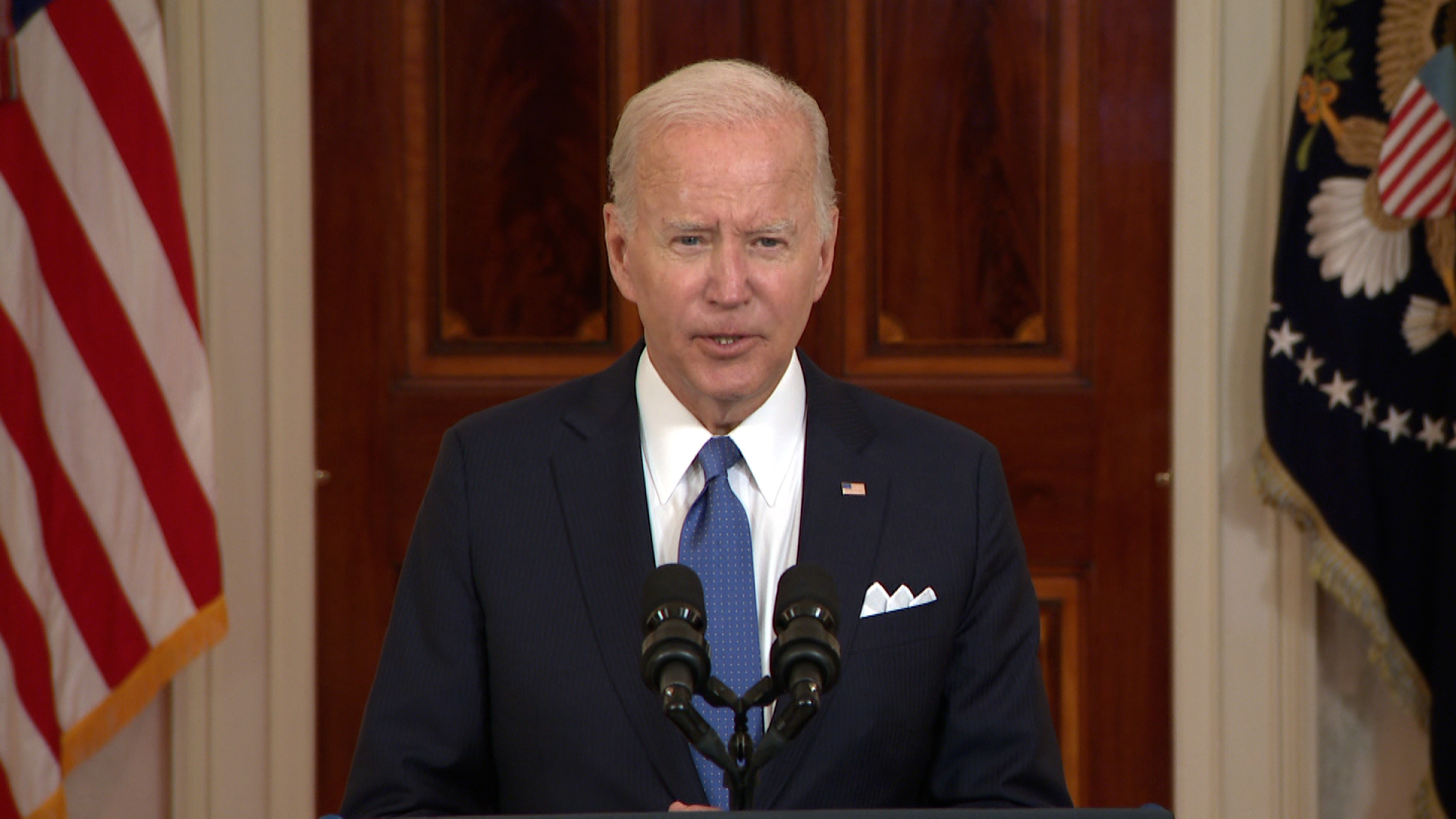
President Biden is delivering remarks on the Supreme Court overturning Roe v. Wade and eliminating the constitutional right to an abortion, according to the White House.
"It's a sad day for the court and for the country," Biden said, speaking from the White House.
The White House has been bracing for the ruling from the nation's highest court, which was announced Friday morning, and has been planning next steps for months.
While there is little the President can do through executive action to fully mitigate the decision — and virtually nothing he can do to restore the nationwide right to an abortion — there are a number of steps Biden has been weighing in consultation with policy aides, political advisers and lawyers.
Some of the options the President has been considering include eliminating barriers to accessing medication abortion and challenging state laws that criminalize out-of-state travel to receive an abortion, CNN has reported. The President could also declare a public health emergency, which could shield doctors from legal liability if they treat patients in states where they are not licensed.
The President has also called for Congress to pass legislation codifying Roe v. Wade, but Democrats currently don't have the votes in the Senate to send such legislation to Biden's desk.
Lead plaintiff in same-sex marriage case slams Thomas' calls for court to reconsider rulings
From CNN's Adam Levine
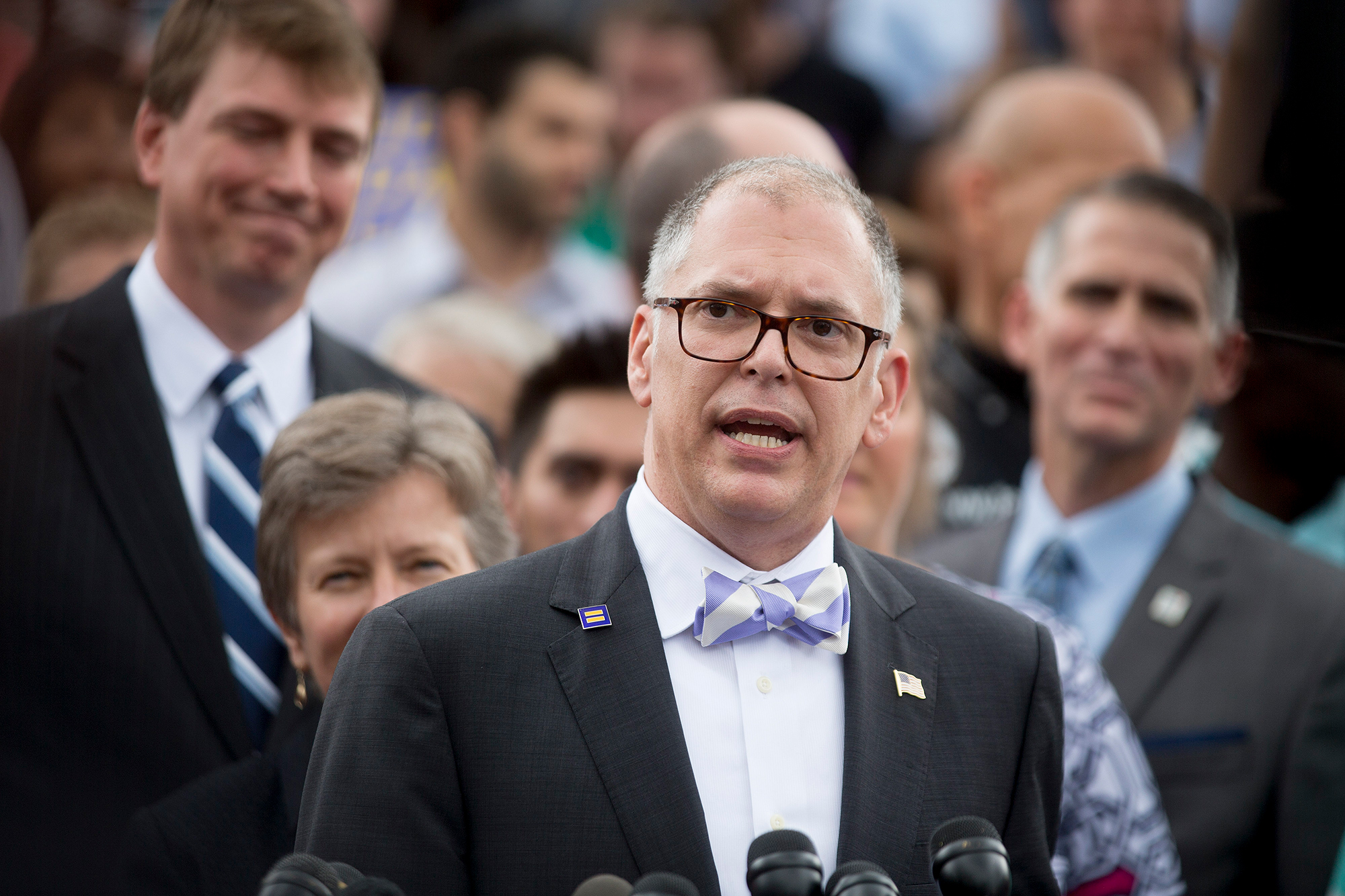
Jim Obergefell, the lead plaintiff in the US Supreme Court case that legalized same-sex marriage, responded to Justice Clarence Thomas writing separately to call explicitly for the court to reconsider its rulings striking down state restrictions on contraceptives, state sodomy bans and state prohibitions on same-sex marriage.
"Clarence Thomas is a Supreme Court justice appointed by humans, he is not the Supreme Deity. The millions of loving couples who have the right to marriage equality to form their own families do not need Clarence Thomas imposing his individual twisted morality upon them. If you want to see an error in judgment, Clarence Thomas, look in the mirror," said Obergefell, also a candidate for the Ohio House, in a statement.
In their dissent, the liberal justices wrote “no one should be confident that this majority is done with its work.”
“The right Roe and Casey recognized does not stand alone,” they wrote. “To the contrary, the Court has linked it for decades to other settled freedoms involving bodily integrity, familial relationships, and procreation. Most obviously, the right to terminate a pregnancy arose straight out of the right to purchase and use contraception. In turn, those rights led, more recently, to rights of same-sex intimacy and marriage.”
Obergefell called the overturning of Roe v. Wade "a sad day" for women's rights.
"The reality is that women today will have less rights than their own mothers. We are going backwards and it’s both enraging and terrifying to see the excessive government overreach that this court is imposing on our country,” he said.
GOP Sen. Collins says abortion decision by Kavanaugh and Gorsuch was "inconsistent"
From CNN's Ariane de Vogue and Daniella Diaz
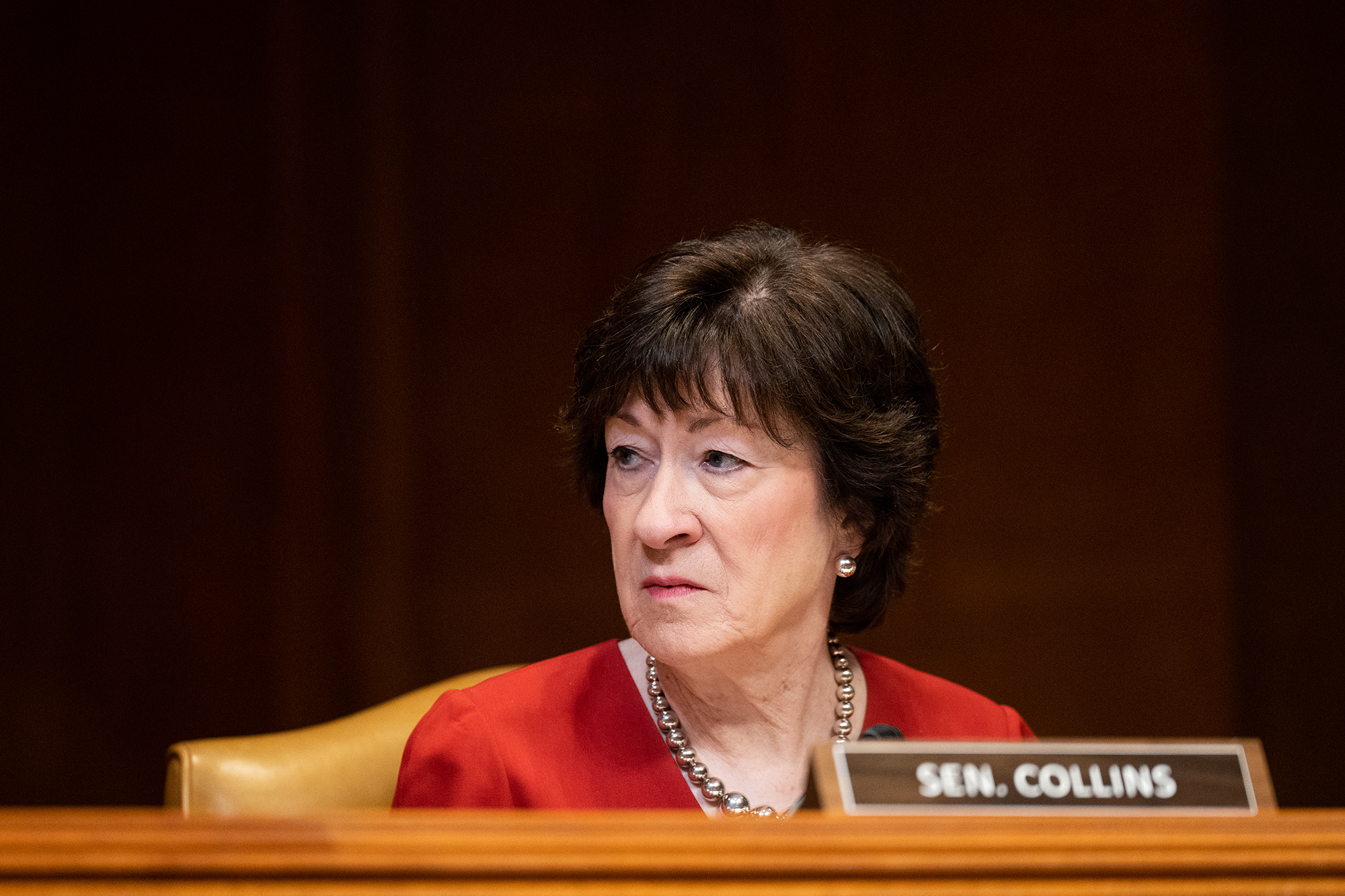
GOP Sen. Susan Collins said the Supreme Court decision to overturn Roe v. Wade was "inconsistent" with what Justice Neil Gorsuch and Justice Brett Kavanaugh said in their testimonies and meetings with her.
“This decision is inconsistent with what Justices Gorsuch and Kavanaugh said in their testimony and their meetings with me, where they both were insistent on the importance of supporting long-standing precedents that the country has relied upon," Collins said in a statement on Friday.
The Republican senator said the Justices indicated they believed in the importance of "supporting long-standing precedents that the country has relied upon."
Collins said earlier this year she introduced legislation with GOP Sen. Lisa Murkowski to "codify the abortion rights established by Roe v. Wade and affirmed by Planned Parenthood v. Casey ." The statement said the bill would reinforce the importance of abortion protections.
“Our goal with this legislation is to do what the Court should have done — provide the consistency in our abortion laws that Americans have relied upon for 50 years," Collins said.
Economists warn about the ill effects of the SCOTUS ruling on women's economic and societal position
From CNN's Ariane de Vogue
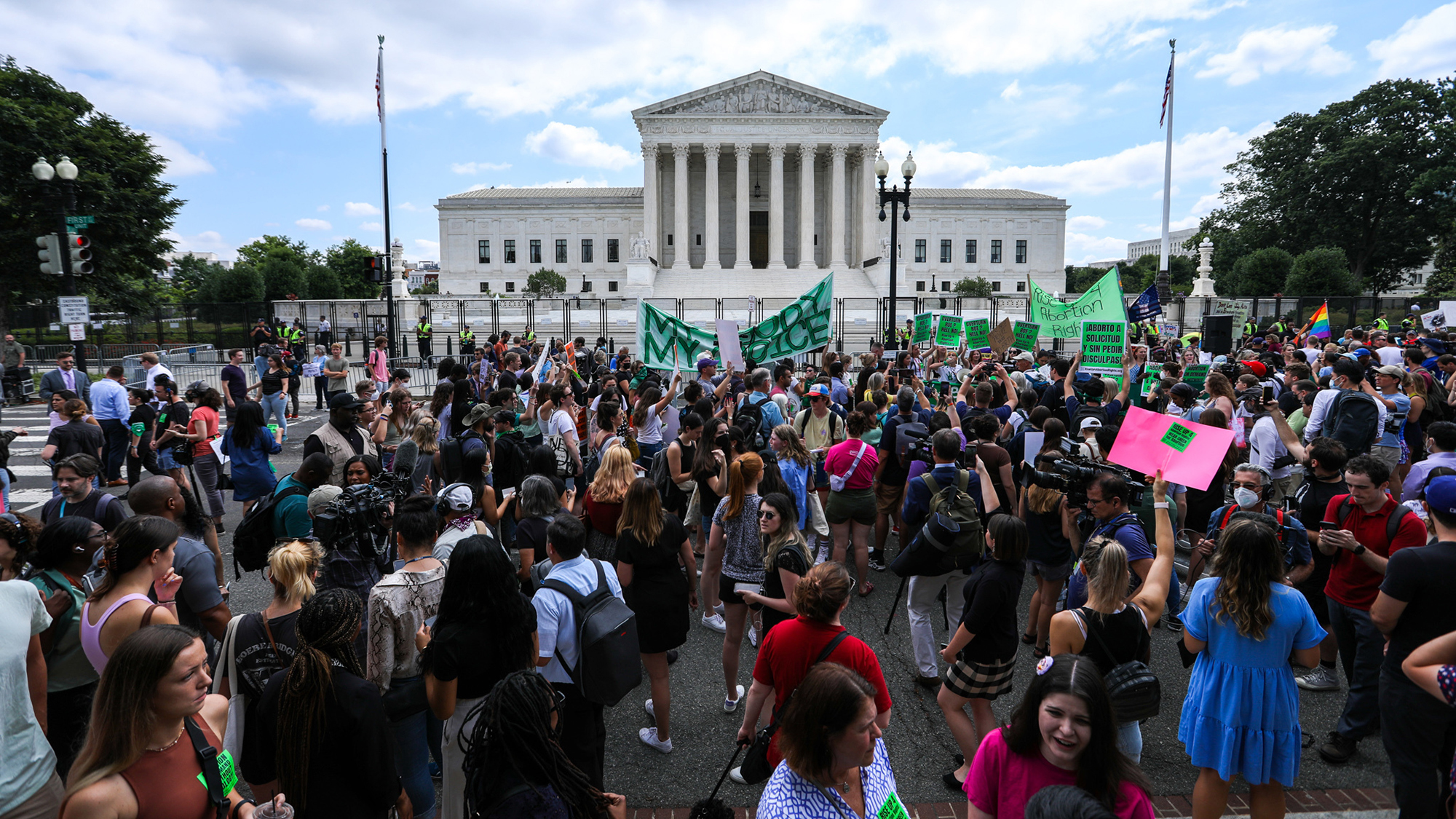
Liberal justices in their dissent of Friday's Supreme Court ruling said it will impact “countless life decisions,” including “whether and how to invest in education or careers, how to allocate financial resources and how to approach intimate family relationships.”
“Taking away the right to abortion, as the majority does today, destroys all those individual plans and expectations,” the dissent said and emphasized “in so doing, it diminishes women’s opportunities to participate fully and equally in the Nation’s political, social, and economic life.”
The language of the dissent mirrored a “ friend of the court brief” filed by economists that targeted the societal and economic effects abortion access has had on women over the last century.
The economists pointed to studies that show that expansion of abortion access ushered in by Roe reduced teen motherhood by 34% and teen marriage by 20%.
“Studies also demonstrate that for women experiencing unintended pregnancies, access to abortion has increased the probability that they attend college and enter professional occupations,” they wrote.
“There is a substantial body of well- developed and credible research that shows that abortion legalization and access in the United States has had—and continues to have—a significant effect on birth rates as well as broad downstream social and economic effects, including on women’s educational attainment and job opportunities,” they concluded.
Mississippi and others, including Justice Amy Coney Barrett at oral arguments, had suggested that abortion access is no longer as relevant to women and their families in the modern day due to improvements in health care and adoption laws.
Please enable JavaScript for a better experience.
Advertisement
Supported by
Democrats Schedule Votes on Abortion Access, but Lack a Legislative Path
Democrats in Congress are under pressure to act after the Supreme Court’s decision. But with Republicans and at least one Democrat opposed in the Senate, the measures are all but certain to fail.
- Share full article

By Annie Karni
WASHINGTON — Democrats in Congress, under pressure to take quick action in response to the Supreme Court’s decision striking down abortion rights, are planning to hold votes this week on legislation that seeks to preserve access to abortions in the post- Roe v. Wade era.
The bills are all but certain to fail in the evenly divided Senate, where broad Republican opposition means they cannot muster the 60 votes to move forward. But Democrats are pushing forward amid a groundswell of pressure from progressives in their ranks who were outraged by the Supreme Court ruling and irate that their leaders appeared to have no plan to respond.
In the immediate aftermath of the decision last month that overturned the nearly 50-year-old precedent that established abortion rights, as protesters gathered outside the Supreme Court demanding action, House Democrats convened on the steps of the Capitol across the street, singing “God Bless America” to celebrate passage of a gun safety bill .
The gesture was widely derided by activists on the left , who denounced the lack of a cogent response from President Biden or from Congress to a ruling that had been anticipated for weeks.
Democrats on Capitol Hill are now moving forward with a plan that is aimed at framing the issue for the midterm elections. Lacking the votes to force action, Democrats are using the debate to show voters where they stand and portray Republicans as out of step with a majority of Americans, who polls consistently show support abortion access.
The first measure, which Speaker Nancy Pelosi plans to bring to a vote this week, would protect the right to travel for abortion services. A second measure, a version of which passed the House last year, would explicitly give health care providers the right to provide abortion services and their patients the right to obtain them, invalidating a variety of restrictions that were enacted in the aftermath of Roe.
Senate Democrats tried and failed in May to take up that legislation , the Women’s Health Protection Act. But Republicans and one Democrat — Senator Joe Manchin III of West Virginia — opposed it, blocking a debate and leaving the measure short of even the simple majority that it would need to clear Congress.
House Democrats also plan to bring up more legislation in the coming weeks that would protect the privacy of patients’ health records, amid concern that law enforcement officials could try to use the data to track pregnancies and enforce abortion restrictions or bans.
Representative Steny H. Hoyer of Maryland, the majority leader, said in a letter to colleagues that leadership would look into more legislative steps “to respond to the Dobbs v. Jackson decision and protect the rights, health and safety of Americans under a court determined to ignore precedent and eager to legislate.”
On Friday, reacting to pressure to respond more forcefully to the Supreme Court decision, Mr. Biden also issued an executive order aimed at ensuring access to contraception and other women’s health services. “A 10-year-old girl shouldn’t be forced to give birth to a rapist’s child,” said Mr. Biden, who grew visibly angry.
On Monday, as a follow-up to the president’s order, the Biden administration instructed hospitals that, even in states where abortion is illegal, federal law required doctors to perform an abortion for a pregnant woman who showed up in the emergency department if they believed it was “the stabilizing treatment necessary” to resolve an emergency medical condition.
“Under the law, no matter where you live, women have the right to emergency care — including abortion care,” Xavier Becerra, Mr. Biden’s health secretary, said in a statement.
Mr. Becerra made his position known in a letter to health care providers , giving them official guidance on their responsibilities under the Emergency Medical Treatment and Active Labor Act, also known as EMTALA, a 1986 law that requires anyone coming to an emergency department to be stabilized and treated, regardless of insurance status or ability to pay.
On Capitol Hill, Democrats plan to debate measures that would preserve as much access to abortion as possible.
One bill, sponsored by Representative Lizzie Fletcher, Democrat of Texas, would prohibit any state from enacting or enforcing a law restricting travel to another state to obtain an abortion.
In Texas, which bans abortion after about six weeks of pregnancy, about 1,400 women are leaving each month seeking abortion care, Ms. Fletcher said. Planned Parenthood health centers in neighboring states have experienced a nearly 800 percent increase in patients seeking abortions since Texas instituted its ban, according to the organization.
“We are hearing legislators in our state already talking about preventing women from leaving the state to obtain abortions, and it’s not just Texas,” Ms. Fletcher said in an interview. “The idea that you can’t leave the state to get reproductive health care in a state where it’s legal makes this is an essential place to start.”
The Senate, however, remains the main blockade to any legislative efforts to codify Roe v. Wade into law. All but two of the chamber’s Republicans oppose abortion rights, leaving little hope that any bill could move forward; with Mr. Manchin also opposed, passage would be all but impossible.
Aware of that reality, Senator Chuck Schumer, Democrat of New York and the majority leader, has turned his focus to the confirmation of circuit judges, unwilling to use his remaining floor time before the midterms on abortion-related bills that have no chance of enactment.
Senator Tim Kaine, Democrat of Virginia, who is a practicing Catholic, and Senator Kyrsten Sinema, Democrat of Arizona, have been working with Senators Susan Collins of Maine and Lisa Murkowski of Alaska, the only two Republican supporters of abortion rights in the Senate, to introduce legislation that would codify the framework of Roe and related cases. But Democrats dismissed an alternative proposal, arguing that it was toothless and lacked clear guidance about what states could and could not do.
Looking for some path to channel the anger felt by many on the left, Senate Democrats are planning to hold hearings in the coming weeks. Senator Richard J. Durbin, Democrat of Illinois and the chairman of the Judiciary Committee, has scheduled a hearing on Tuesday on the legal consequences of the Dobbs decision and “to explore the grim reality of a post-Roe America.” Witnesses include Dr. Colleen P. McNicholas, a Planned Parenthood abortion provider in Missouri and Southern Illinois.
Senator Patty Murray, the chairwoman of the Health, Education, Labor and Pensions Committee, has scheduled another hearing for next week with abortion providers and physicians.
Many progressives say the spate of hearings and votes come too late.
“It’s inexcusable for Democratic leadership to have known for months that this was coming and muster such an anemic, milquetoast response,” said Stephanie Taylor, a founder of the Progressive Change Campaign Committee. “It’s one thing to not show up with the necessary outrage for this kind of news; it’s another not to show up with a battle plan.”
Elected Democrats have also urged Mr. Biden to do more, including declaring a public health emergency to protect abortion access for all Americans; directing federal agencies to increase the accessibility of medication abortion; providing vouchers for travel and child care for people seeking access to abortion care out of state; and using federal property to increase access to abortion.
Some lawmakers also want to focus on the Senate confirmation process for Supreme Court nominees, arguing that the Dobbs decision exposed how broken it is. Representatives Ted Lieu, Democrat of California, and Alexandria Ocasio-Cortez, Democrat of New York, called on Mr. Schumer to formally establish a position on whether Justices Brett M. Kavanaugh and Neil M. Gorsuch lied under oath during their confirmations, misleading senators by saying that Roe v. Wade and Planned Parenthood v. Casey were established precedent and implying that they would not support invalidating them.
“We must call out their actions for what they were before the moment passes,” Mr. Lieu and Ms. Ocasio-Cortez wrote in the letter, “so that we can prevent such a mendacious denigration of our fundamental rights and the rule of law from ever happening again.”
Stephanie Lai and Sheryl Gay Stolberg contributed reporting from Washington.
Annie Karni is a congressional correspondent. She was previously a White House correspondent. Before joining The Times, she covered the White House and Hillary Clinton's 2016 presidential campaign for Politico, and spent a decade covering local politics for the New York Post and the New York Daily News. More about Annie Karni
From The Rachel Maddow Show
- ALL MADDOWBLOG POSTS
- THE RACHEL MADDOW SHOW
- FULL EPISODES
- RACHEL ON THREADS
Nearly every GOP rep rejects bill to protect interstate abortion travel
By Steve Benen
The House took up a couple of bills late last week on abortion rights, including re-passing the Women’s Health Protection Act, which cleared the chamber with literally zero GOP votes. But it was the other bill that I was watching with just as much interest. The New York Times reported :
One measure, which passed mainly along party lines, 222 to 205, would protect the right to travel across state lines for abortion services, with three Republicans joining Democrats in support of the measure.
The Democratic majority was unanimous in its support for the Ensuring Access to Abortion Act, but they were joined by a trio of GOP representatives — two of whom, Illinois’ Adam Kinzinger and Michigan’s Fred Upton, are retiring at the end of this term. The third was Pennsylvania’s Brian Fitzpatrick, who’s running for re-election in a competitive district just north of Philadelphia.
Meanwhile, 205 Republicans voted against it.
The standard GOP line remains the same: As things stand, there are no laws limiting Americans’ ability to travel across state lines for reproductive care, so there’s no need to pass federal legislation to address a problem that doesn’t exist.
As we discussed last week, it’s not an outlandish argument: The Democratic bill is inherently preemptive, intended to address a threat, not restrictions that have already been implemented.
But as The New York Times’ Jamelle Bouie noted in his latest column , while the Supreme Court “has recognized a right to travel between states on multiple occasions in cases stretching back to the 19th century,” it’s also true that “some Republican-led states want to take the law” in a radical new direction.
Missouri lawmakers have introduced a “bounty” bill similar to the one now in operation in Texas, which would allow private citizens to sue anyone who helps a resident obtain an abortion out of state. Another bill would apply Missouri’s laws to abortions that occur in other states.
The Texas Tribune reported in May, meanwhile, that some GOP legislators also want to approve measures that would “prevent pregnant Texans from seeking legal abortions in other states.”
The Washington Post reported late last month, “Several national anti-abortion groups and their allies in Republican-led state legislatures are advancing plans to stop people in states where abortion is banned from seeking the procedure elsewhere.”
For proponents of reproductive rights, these circumstances are already difficult to defend. Americans, they argue, shouldn’t have to travel to other states — if they can afford it — in order to receive reproductive care. But for some Republicans, this restrictive status quo still isn’t good enough: They’re eyeing policies designed to prevent Americans from terminating unwanted pregnancies in more progressive states, making measures such as the Ensuring Access to Abortion Act more than just election year posturing.
The bill now heads to the Senate, where a related measure has already been blocked once. The odds of the legislation overcoming a Republican filibuster are effectively zero, though the larger debate on this issue is just getting started.
Steve Benen is a producer for "The Rachel Maddow Show," the editor of MaddowBlog and an MSNBC political contributor. He's also the bestselling author of "The Impostors: How Republicans Quit Governing and Seized American Politics."

- facebook-page
- twitter-page
- instagram-page
- youtube-page
- Search Search Search
Press Releases

An official website of the United States government
Here's how you know
Official websites use .gov A .gov website belongs to an official government organization in the United States.
Secure .gov websites use HTTPS A lock ( Lock A locked padlock ) or https:// means you’ve safely connected to the .gov website. Share sensitive information only on official, secure websites.
- The Attorney General
- Organizational Chart
- Budget & Performance
- Privacy Program
- Press Releases
- Photo Galleries
- Guidance Documents
- Publications
- Information for Victims in Large Cases
- Justice Manual
- Business and Contracts
- Why Justice ?
- DOJ Vacancies
- Legal Careers at DOJ
- Our Offices
Archived Press Releases
Archived News
Para Notícias en Español
Justice Department Files Statement of Interest in Case on Right to Travel to Access Legal Abortions
The Justice Department filed a statement of interest today in two consolidated lawsuits seeking to protect the right to interstate travel, including the right to travel to another state to obtain an abortion that is legal in the destination state. The statement of interest explains that the Constitution protects the right to travel across state lines and engage in conduct that is lawful where it is performed and that states cannot prevent third parties from assisting others in exercising that right. The statement argues that the Alabama Attorney General’s threatened prosecutions of individuals for providing assistance to people seeking lawful out-of-state abortions are therefore unconstitutional. The cases are Yellowhammer Fund v. Marshall and West Alabama Women’s Center, et al., v. Marshall .
“As I said the day Dobbs was decided, bedrock constitutional principles dictate that women who reside in states that have banned access to comprehensive reproductive care must remain free to seek that care in states where it is legal,” said Attorney General Merrick B. Garland. “This filing demonstrates the Justice Department’s commitment to defending the constitutional right to travel and to protecting reproductive freedom under federal law.”
“The Reproductive Rights Task Force has been scrutinizing state laws and enforcement actions that threaten to infringe on federal protections of reproductive rights, including illegal attempts to prevent interstate travel,” said Associate Attorney General Vanita Gupta. “Today’s filing is just one part of the Justice Department’s ongoing work to use all available tools to safeguard reproductive freedoms protected by the Constitution and federal law.”
“Alabama may not infringe the constitutional right to travel in order to meet its policy goals,” said Principal Deputy Assistant Attorney General Brian Boynton, head of the Justice Department’s Civil Division. “The Civil Division will continue to assert the interests of the United States.”
The Department’s statement of interest explains that the right to travel from one state to another is firmly embedded in the Supreme Court’s jurisprudence and the Constitution. It notes that Justice Kavanaugh — one of the five justices who formed the majority in Dobbs v. Jackson Women’s Health Organization — has explained that the question of whether a State may “bar a resident of that State from traveling to another State to obtain an abortion” is “not especially difficult” — “the answer is no based on the constitutional right to interstate travel.” The Department’s filing also explains that the Supreme Court has held that states may not prevent third parties from assisting others in exercising their right to travel. Further, the statement of interest explains that because of these precedents, the Alabama Attorney General may not criminalize third-party assistance for interstate travel, particularly where the sole purpose of those prosecutions is to impede individuals’ exercise of their constitutional rights.
The plaintiffs in these cases are organizations and individuals within Alabama seeking to facilitate individuals’ access to legal, out-of-state abortions. They brought suit in response to the Alabama Attorney General’s argument that he may criminally prosecute individuals within Alabama who assist others in obtaining legal, out-of-state abortions. Specifically, the Alabama Attorney General contends that providing assistance within Alabama to someone seeking an out-of-state abortion constitutes a criminal conspiracy, regardless of whether the abortion is legal in the state where it is performed, as long as the abortion would be illegal if performed within Alabama. Plaintiffs have challenged the Alabama Attorney General’s threatened conspiracy prosecutions on a variety of grounds, including as being inconsistent with the Constitution’s right to travel.
Following the Supreme Court’s decision in Dobbs overturning Roe v. Wade , the Justice Department has worked with commitment and urgency to defend the reproductive freedoms that are protected by federal law. The Reproductive Rights Task Force, led by Associate Attorney General Gupta, consists of senior officials and dedicated staff from across a dozen Department components who are working daily to address complex and widespread threats to reproductive health in the wake of Dobbs . Since the Task Force was formed , one of its core responsibilities has been to assess state and local legislation and enforcement actions that threaten to impair women’s right to seek reproductive care in states where it is legal and to coordinate appropriate federal government responses to those actions, including proactive and defensive legal action where appropriate. Additional information on the work of the Task Force can be found at www.justice.gov/reproductive-rights .
Related Content
Elara Caring, and its wholly owned subsidiaries JHH/CIMA Holdings Inc., CIMA Healthcare Management Inc., CIMA Hospice of Texarkana L.L.C., CIMA Hospice of East Texas L.L.C. and CIMA Hospice of El...
This afternoon, a Deputy U.S. Marshal and two Task Force Officers were killed in the line of duty and multiple other officers were wounded while serving a state arrest warrant...
The Justice Department announced today that it has settled 139 administrative claims arising from allegations of sexual abuse committed by former physician and USA Gymnastics official Lawrence Gerard Nassar.
US Justice department says Constitution protects right to travel for abortion
- Medium Text
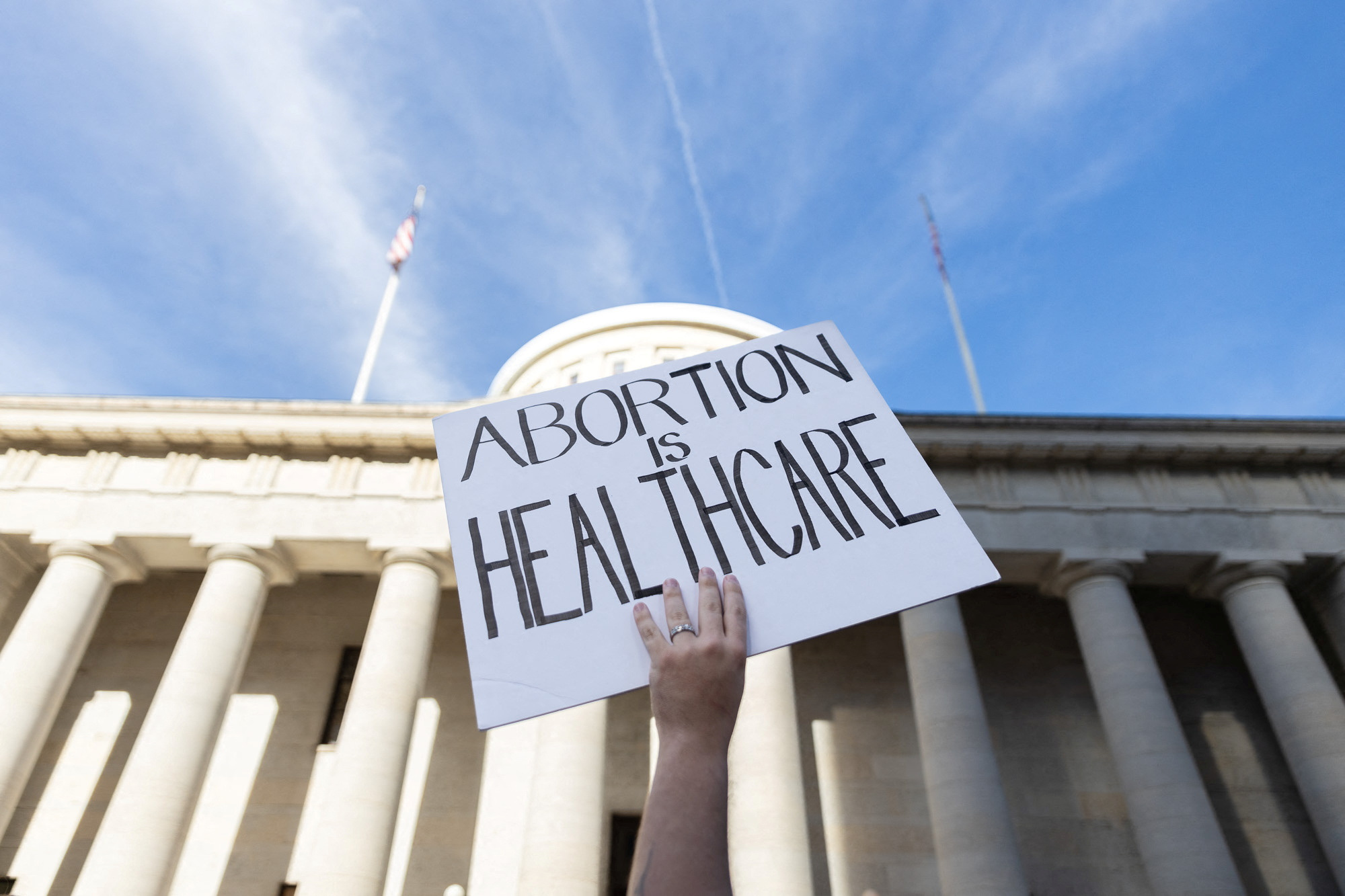
Sign up here.
Reporting by Costas Pitas, Dan Whitcomb and Andrew Goudsward; Editing by Chris Reese
Our Standards: The Thomson Reuters Trust Principles. New Tab , opens new tab

World Chevron

US election 2024: Who are the presidential candidates?
President Joe Biden and former President Donald Trump will face each other in the U.S. presidential election on Nov. 5 in what looks set to be a divisive, closely fought contest. Several third-party hopefuls are also running.
Australia will spend almost A$1 billion on payments for those fleeing domestic violence and introduce new measures to police pornography and violence on the internet in response to what the government is calling a "national crisis" of gendered violence.
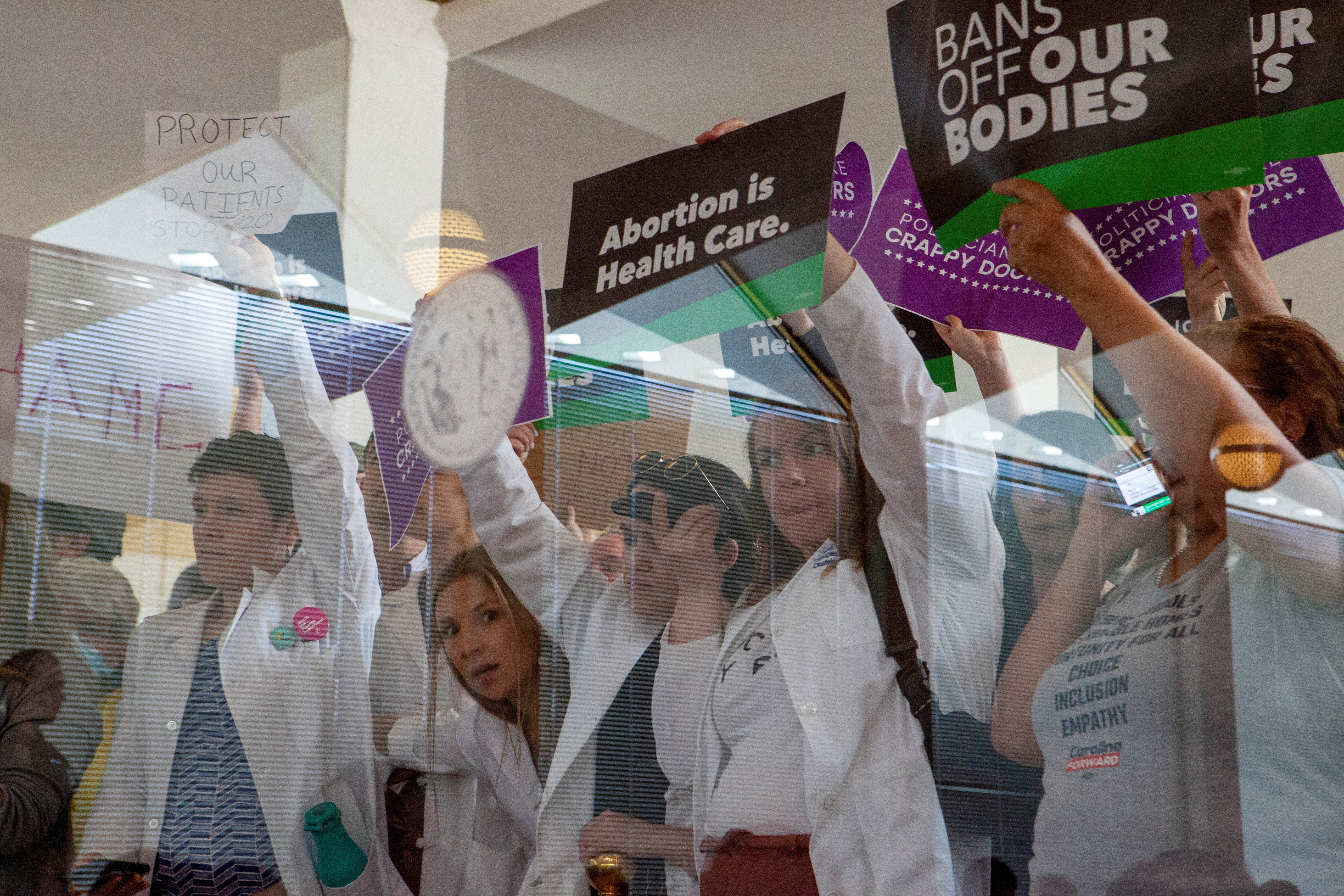
A Russian ballistic missile struck the Ukrainian port of Odesa late on Wednesday, injuring at least 13 people and triggering a large fire, Regional Governor Oleh Kiper said on Telegram.
Abortion now illegal after 6 weeks in Florida, with few exceptions. Here's what that means

As of Wednesday, May 1, most abortions in Florida after six weeks will be illegal.
The state's previous 15-week ban passed in 2022 went into effect a month ago, when the state Supreme Court overruled a 34-year-old decision that said a privacy provision in the state constitution protected a woman’s right to terminate a pregnancy. But that ruling also triggered a more restrictive 6-week ban passed by the Florida Legislature last year to go into effect 30 days later.
That means Florida is no longer the southern state with the least restrictive abortion laws. Floridians needing or wanting abortions after six weeks of pregnancy would need to travel to North Carolina, where the limit is 12 weeks, or up to Virginia where there are no laws banning abortion.
Previously Florida was the destination for people in the South with little or no access to abortion services, more than 25,000 in the last five years, according to the nonprofit site KFF Health News .
Abortion is currently banned in 14 states, limited to gestational periods between six and 12 weeks in five, between 15 and 22 weeks in 6 more, and has no bans in 25 states and Washington, D.C. according to nonprofit KFF. Many GOP-led states rushed to enact abortion bans after the U.S. Supreme Court struck down Roe v. Wade in 2022.
Prep for the polls: See who is running for president and compare where they stand on key issues in our Voter Guide
However, the Florida Supreme Court also ruled that a proposed constitutional amendment about abortion could go on the November ballot this year. If voters approve it, Florida's abortion laws would go back to more or less what they were when Roe v. Wade was still in force.
Florida abortion rulings: A win for both sides, but voters have last say with Amendment 4
What are Florida's abortion laws?
As of May 1, all abortions (with a few exceptions) are illegal in the state of Florida after a "physician determines the gestational age of the fetus is more than 6 weeks," a time when many pregnant people don't yet know they're pregnant.
People may have as little as two weeks after missing a period to find out and get both appointments at the state's overworked clinics, which leaves an extremely narrow window for a pregnant person in a potentially traumatic situation to take action. The state also requires a 24-hour waiting period so patients will need to fit two appointments before the legal deadline
However, while the law reduces the amount of time pregnant people have to get an abortion, it does provide some exemptions for rape and incest that the 15-week ban lacked, something that drew criticism even from some supporters.
How many people got abortions in 2023? New report finds increase despite bans
When do most people find out they're pregnant?
According to a 2021 study from ANSIRH (Advancing New Standards in Reproductive Health) at the University of California San Francisco, about one in three people confirm their pregnancies after six weeks, and one in five after seven weeks.
"Later confirmation of pregnancy is even higher among young people, people of color, and those living with food insecurity," the study's summary said, "suggesting that gestational bans on abortion in the first trimester will disproportionally hurt these populations."
Does Florida's 6-week abortion law include exemptions for danger to the mother?
Yes, but only for extreme cases. Two physicians must certify, in writing, that in their judgment an abortion is necessary "to save the pregnant woman’s life or avert a serious risk of substantial and irreversible physical impairment of a major bodily function." One physician may certify it if another is unavailable at the time.
This requires physicians willing to risk possible fines, loss of license and even imprisonment by going on record against oversight committees and the state. Attempts by Democrats to clarify the conditions under which a physician may make that call without risking their medical license were struck down.
Does the 6-week abortion ban in Florida include exemptions for a fetus that has died or is going to die?
Yes. If two physicians have certified in writing that in reasonable medical judgment, the fetus has a fatal fetal abnormality, the pregnancy may be terminated.
However, the law now contains new language requiring that the pregnancy must not have "progressed to the third trimester," which could be interpreted to mean that abortions for fatal fetal abnormalities are banned after 27 weeks.
Does the 6-week abortion ban in Florida include exemptions for rape or incest?
Abortions are permitted in the case of rape, incest or human trafficking but only up to 15 weeks, and only if the pregnant person has copies of "a restraining order, police report, medical record, or other court order or documentation" to provide evidence that they are a victim of rape or incest.
If the pregnant person is a minor, the physician must report the incident of rape or incest to the central abuse hotline.
Abortion rights battle: Abortion rights inspire these young voters like no other issue. How they're fighting ahead of 2024.
Does the 6-week abortion ban in Florida ban abortion pills?
Abortion pills are banned unless they are administered by a licensed doctor in person.
So-called "abortion pills" — actually two pills, mifepristone and misoprostol , taken up to 48 hours apart — which cause a person’s cervix to dilate and their uterus to contract, emptying the embryo from the person’s uterus, have dramatically risen in popularity in the last few years both for the relative convenience compared to surgical abortions and to get around abortion bans. Access to them has been challenged and will be decided by the U.S. Supreme Court .
The new law clearly states that abortions may only be performed by a physician in the same room. Telehealth sessions are specifically banned.
Can I go to jail for getting an abortion after 6 weeks in Florida?
Florida law prohibits anyone from willfully performing or actively helping someone get an abortion outside of the six-week gestational period or the legal exemptions. Doing so is considered a third-degree felony, punishable by fines and imprisonment of five years. It is unclear if the pregnant person is also liable.
What were Florida's abortion laws before?
Before the 15-week ban, the Roe v. Wade standard had applied across the country for decades. Abortions were legal:
- To the end of the first trimester (up to 12 weeks) for any reason
- During the second trimester (up to 24 weeks) to protect the health of the pregnant person
- During the third trimester if necessary to preserve the pregnant person's life or health
A full-term pregnancy is considered to be 39-40 weeks .
Protection for abortion travelers: Biden's new HIPAA rule shields medical records for out-of-state abortions
What would Amendment 4, Florida's abortion amendment do?
The proposed amendment submitted by Floridians Protecting Freedom that will appear on November's ballot reads:
“No law shall prohibit, penalize, delay, or restrict abortion before viability or when necessary to protect the patient’s health, as determined by the patient’s healthcare provider. This amendment does not change the Legislature’s constitutional authority to require notification to a parent or guardian before a minor has an abortion.”
Fetal viability has been put at about 24 weeks.
For the amendment to pass it must win by a supermajority, or at least 60% of the vote. According to an exclusive USA TODAY/Ipsos poll of more than 1,000 Floridians, half said they would vote in favor.
To revisit this article, visit My Profile, then View saved stories .
- Backchannel
- Newsletters
- WIRED Insider
- WIRED Consulting
Thor Benson
Interstate Travel Post- Roe Isn’t as Secure as You May Think

Now that Congress has failed to pass a bill that would guarantee a right to travel across state lines to obtain an abortion, many are worried that conservative states that have started restricting abortion rights could soon decide to block people seeking abortions from leaving their own state for that purpose. Many Republican lawmakers are already discussing this possibility. But would such drastic restrictions even be possible—or, at the very least, legal?
The Biden administration, aware that Congress will likely not act on abortion rights before the November midterms, has been making efforts to determine what the executive branch can do to protect abortion access on its own. President Joe Biden signed an executive order at the beginning of the month that directed the Department of Health and Human Services (HHS) to expand access to abortion pills, protect patient privacy, and more.
Following that executive order, the US Department of Justice announced the establishment of a Reproductive Rights Task Force, which will “monitor and evaluate” efforts to ban abortion pills, prevent someone from obtaining an abortion in a state where it is legal, or punish federal employees who provide health care that is legal at the federal level. How much the Department of Justice can do to protect the right to travel across state lines for an abortion, and whether states can ban people from doing so remain glaring unknowns.
In terms of what the Justice Department can do if a state were to ban traveling to obtain an abortion, the most likely response would be a lawsuit against that state. Mary Ziegler, a law professor at UC Davis, says the agency would argue that such a ban is unconstitutional. (The DOJ itself did not respond to a request for comment.)
Justice Brett Kavanaugh wrote in his concurring opinion in Dobbs v. Jackson Women's Health Organization , which overturned Roe v. Wade , that states may not ban people from traveling across state lines to get an abortion. That being said, Ziegler isn’t exactly confident the right to travel will remain protected.
“What Kavanaugh said was really vague. It’s true there’s a right to travel, but I don’t know how much that gets you,” says Ziegler. “There used to be a right to abortion, and now there is not. When the court is talking about unenumerated rights, that can change. Even if you take Kavanaugh at his word about this, that doesn’t answer all of the questions.”

Boone Ashworth

Carlton Reid

Amanda Hoover

Reece Rogers
The right to travel is generally seen as protected by the Fourteenth Amendment, and this has been upheld by the Supreme Court in the past. However, the right to an abortion was also seen as something that was protected by the Fourteenth Amendment until Roe was overturned.
“I think efforts to try and deal with the right to travel—this is uncharted territory in a lot of ways. There’s not a lot of broad precedent about the right to travel,” says Melissa Murray, a law professor at New York University. “A lot of it is going to present issues that for some courts will feel or seem like a first impression.”
In order to avoid an anti-travel law being struck down by the courts, a state could craft legislation that effectively but not explicitly bans interstate travel. Texas’ SB 8, which banned abortion after six weeks prior to Roe being struck down, was able to survive judicial review because it is effectively enforced by private individuals or groups, in the form of lawsuits, instead of the state. Interestingly enough, research from the University of Texas at Austin found that out-of-state travel dramatically increased following the passage of SB 8.
Rachel Rebouché, interim dean and a professor of law at the Temple University School of Law, says a lawsuit from the Department of Justice over anti-travel legislation may not be successful.
“SB 8 in Texas was unconstitutional, and it’s still in force. It was in force while there was Roe on the books. I’m not sure we can predict with any certainty what future courts are going to hold,” says Rebouché. “There’s already case law of a law that a court could interpret as unconstitutional at the time it was passed being shielded from federal court review because of the kind of enforcement mechanism it has.”
Without Congress passing a law to protect the right to travel, it will likely be difficult for the Department of Justice to defend that right. Rebouché says the department needs to look at all of the laws that are already on the books, such as laws related to interstate commerce or civil rights, and see if there are any that would allow it to enforce the right to travel.
“The DOJ is a huge entity with so many moving parts, so many different kinds of powers and responsibilities. Thinking about how it could intervene means thinking creatively about where are these touch points of DOJ powers and duties that might touch on abortion access,” Rebouché says.
What is clear is that a showdown between the Department of Justice, states, and the courts is likely fast approaching. If the DOJ is going to prioritize protecting abortion access, it will have to do a full survey of every power it has available and hope the Supreme Court doesn’t decide that it doesn’t, in fact, have those powers.
You Might Also Like …
In your inbox: Get Plaintext —Steven Levy's long view on tech
What if your AI girlfriend hated you? Meet the enraged chatbot
The showdown over who gets to build the next DeLorean
What’s the safest seat on an airplane ? All of them and none of them
Virtual briefing: Will AI kill the app ? Hear from our panel of experts

Makena Kelly

Dell Cameron

Max Blaisdell

Eric Geller


Mobile Menu Overlay
The White House 1600 Pennsylvania Ave NW Washington, DC 20500
FACT SHEET: Biden- Harris Administration Continues the Fight for Reproductive Freedom
Nearly two years after the Supreme Court overturned Roe v. Wade and the constitutional right to choose, millions of Americans are living under extreme state abortion bans. These dangerous laws are putting women’s health and lives at risk and threatening doctors with jail time, including life in prison, for providing the health care they have been trained to provide. And Republicans’ extreme out-of-touch agenda has put access to fertility treatments at risk for families who are desperately trying to get pregnant. Tonight, Kate Cox and Latorya Beasley will join the First Lady as her guests at the State of the Union. Kate, a mother of two from Texas, has experienced the devastating consequences of state abortion bans and courageously spoke out about her experience seeking the care she needed to preserve her health—becoming one of the first women in 50 years to have to turn to the courts to ask permission to receive the abortion that her doctor recommended. She, like too many other women across the country, was ultimately forced to travel out of state for care that she would have been able to receive if Roe v. Wade were still the law of the land. After a ruling from the Alabama Supreme Court put access to in vitro fertilization (IVF) on pause in much of the state, Latorya and her husband, who had been preparing for another round of IVF, learned that their embryo transfer was abruptly canceled. This heartbreaking setback in her and her husband’s journey to have their second child through IVF is yet another example of how the overturning of Roe v. Wade has disrupted access to reproductive health care for women and families across the country. President Biden and Vice President Harris believe that stories like Kate’s and Latorya’s should never happen in America. But Republican elected officials want to impose this reality on women nationwide. They are doubling down on their assault on fundamental freedoms by proposing ever-more extreme bans in states and three national abortion bans in Congress. And, just last week, Senate Republicans blocked a vote to safeguard nationwide access to IVF. Their ongoing disregard for women’s ability to make these decisions for themselves and their families is outrageous and unacceptable. Tonight, President Biden will again call on Congress to restore the protections of Roe v. Wade in federal law so women in every state have the freedom to make deeply personal health care decisions. And the Biden-Harris Administration will continue to take executive action to protect access to reproductive health care, including through ongoing implementation of the President’s three Executive Orders and a Presidential Memorandum issued since the Court overturned Roe v. Wade . To date, the Administration has taken action to:
- Protect access to abortion, including FDA-approved medication abortion;
- Defend access to emergency medical care;
- Support the ability to travel for reproductive health care;
- Strengthen access to high-quality, affordable contraception;
- Safeguard the privacy of patients and health care providers; and
- Ensure access to accurate information and legal resources.
Protect Access to Abortion, Including FDA-Approved Medication Abortion The Administration will continue fighting to protect a woman’s ability to access abortion care, including by defending access to FDA-approved, safe and effective medication abortion. The Administration will continue to:
- Protect Access to Safe and Legal Medication Abortion. On what would have been the 50th anniversary of Roe v. Wade , President Biden issued a Presidential Memorandum directing agencies to consider further efforts to support patients, providers, and pharmacies who wish to legally access, prescribe, or provide medication abortion. This Presidential Memorandum followed independent, evidence-based action taken by the Food and Drug Administration (FDA) to allow mifepristone to be prescribed by telehealth and sent by mail as well as to enable interested pharmacies to become certified to dispense the medication. As a result of the new pathway established by FDA, many pharmacies across the country—including major retail pharmacy chains—are now certified to dispense medication abortion. This new option gives many women the option to pick up their prescription for medication abortion at a local, certified pharmacy just as they would for any other medication.
- Defend FDA Approval of Medication Abortion in Court. FDA and the Department of Justice (DOJ) are defending access to mifepristone—a safe and effective drug used in medication abortion that FDA first approved more than twenty years ago—and FDA’s independent, expert judgment in court, including in a lawsuit before the Supreme Court that attempts to curtail access nationwide. The Administration will continue to stand by FDA’s decades-old approval and regulation of the medication as well as FDA’s ability to review, approve, and regulate a wide range of prescription medications. Efforts to impose outdated restrictions on mifepristone would limit access to this critical medication in every state in the country.
- Partner with State Leaders on the Frontlines of Abortion Access. The White House continues to partner with leaders on the frontlines of protecting access to abortion—both those fighting extreme state legislation and those advancing proactive policies to protect access to reproductive health care, including for patients who are forced to travel out of state for care. The Vice President has led these efforts, traveling to 20 states and meeting with more than 250 state legislators, health care providers, and advocates in the past year. And, on what would have been the 51st anniversary of Roe , the Vice President launched her nationwide Fight for Reproductive Freedoms tour to continue fighting back against extreme attacks throughout America.
- Provide Access to Reproductive Health Care for Veterans. The Department of Veterans Affairs (VA) issued a final rule to allow VA to provide abortion counseling and, in certain circumstances, abortion care to veterans and VA beneficiaries. Under this rule, VA provides abortion services when the health or life of the patient would be endangered if the pregnancy were carried to term or when the pregnancy is a result of rape or incest. When working within the scope of their federal employment, VA employees may provide abortion services as authorized by federal law regardless of state restrictions.
- Support Access to Care for Service Members. The Department of Defense (DoD) has taken action to ensure that Service members and their families can access reproductive health care and that DoD health care providers can operate effectively. DoD released policies to support Service members and their families’ ability to travel for lawful reproductive health care, including abortion care and assisted reproductive technology services, and to bolster Service members’ privacy and afford them the time and space needed to make personal health care decisions.
Defend Access to Emergency Medical Care All patients, including women experiencing pregnancy loss and other pregnancy-related emergencies, must be able to access the emergency medical care required by federal law. The Administration will continue to:
- Defend Access to Emergency Abortion Care. Republican elected officials have put women’s lives at risk by banning abortion even when a doctor determines that an abortion is necessary to prevent serious health consequences. The Administration is committed to ensuring that women who are experiencing pregnancy loss and other pregnancy-related emergencies have access to the full rights and protections for emergency medical care afforded under the Emergency Medical Treatment and Labor Act (EMTALA)—including abortion care when that is the stabilizing treatment required. The Department of Health and Human Services (HHS) issued guidance and Secretary Becerra sent letters to providers affirming the Administration’s view that EMTALA preempts conflicting state law restricting access to abortion in emergency situations. The DOJ has taken action defend and enforce that interpretation before the Supreme Court, which is expected to rule by June.
- Educate Patients and Health Care Providers on Their Rights and Obligations for Emergency Medical Care. To increase awareness of EMTALA and improve the procedures for ensuring that patients facing all types of medical emergencies receive the care to which they are entitled, HHS issued a comprehensive plan to educate all patients about their rights and to help ensure hospitals meet their obligations under federal law. This effort included the launch of new accessible and understandable resources about rights and protections for patients under EMTALA and the process for submitting a complaint. HHS will also disseminate training materials for health care providers and establish a dedicated team of experts who will increase the Department’s capacity to support hospitals and providers across the country in complying with federal requirements—to help ensure that every patient receives the emergency medical care required under federal law.
Support the Ability to Travel for Reproductive Health Care Women must be able to cross state lines to access legal reproductive health care. In the face of threats to the constitutional right to travel, the Administration will continue to:
- Defend the Right to Travel. On the day the Supreme Court overturned Roe v. Wade , President Biden reaffirmed the Attorney General’s statement that women must remain free to travel safely to another state to seek the care they need. In November 2023, DOJ filed a statement of interest in two lawsuits challenging the Alabama Attorney General’s threat to prosecute people who provide assistance to women seeking lawful out-of-state abortions. DOJ explained that the threatened Alabama prosecutions infringe the constitutional right to travel and made clear that states may not punish third parties for assisting women in exercising that right. DOJ continues to monitor states’ efforts to restrict the constitutional right to travel across state lines to receive lawful health care.
- Support Patients Traveling Out of State for Medical Care. HHS issued a letter to U.S. governors inviting them to apply for Section 1115 waivers to expand access to care under the Medicaid program for women traveling from a state where reproductive rights are under attack and women may be denied medical care. HHS continues to review pending waiver applications and encourage state leaders to develop new waiver proposals that would support access to reproductive health care services.
Strengthen Access to High-Quality, Affordable Contraception Contraception is an essential component of reproductive health care and has only become more important in the wake of the overturning of Roe v. Wade . In addition to FDA’s approval of the first daily oral contraceptive for over-the-counter use, the Administration will continue to:
- The Departments of the Treasury, Labor, and HHS issued new guidance to clarify standards and support expanded coverage of a broader range of FDA-approved contraceptives at no cost under the Affordable Care Act. This action builds on guidance issued in July 2022 to clarify protections for contraceptive coverage under the Affordable Care Act.
- The Office of Personnel Management strengthened access to contraception for federal workers, retirees, and family members by issuing guidance to insurers participating in the Federal Employee Health Benefits Program that incorporates the Departments’ guidance. OPM has also newly required insurers that participate in the Federal Employee Health Benefits Program to take additional steps to educate enrollees about their contraception benefits.
- The Secretary of HHS issued a letter to private health insurers, state Medicaid programs and state Children’s Health Insurance Programs, and Medicare plans about their obligations to cover contraception for those they serve. The letter targets a wide range of payers to advance compliance with existing standards and underscore the Administration’s commitment to ensuring that women across the country can access affordable contraception.
- The Departments of the Treasury, Labor, and HHS issued a Request for Information to solicit public input on how to best ensure coverage and access to over-the-counter preventive services, including contraception, at no cost and without a prescription from a health care provider.
- Vice President Harris and the Department of Education convened representatives from 68 college and university leaders in 32 states to hear promising strategies from leaders of postsecondary institutions for protecting and expanding access to contraception for their students and on campus.
- The Gender Policy Council, Domestic Policy Council, and leaders from the Departments of the Treasury, Labor, and HHS called on private sector leaders to take robust additional actions to further expand access to contraception.
- The Gender Policy Council and the Department of Health and Human Services joined a convening focused on strategies to expand the role of pharmacies and pharmacists in promoting access to contraception and breaking down barriers for consumers.
- Expand Access to More Women Under the Affordable Care Act. The Departments of the Treasury, Labor, and HHS proposed a rule to help ensure that all women with private health coverage who need and want contraception can obtain it without cost sharing as guaranteed under the Affordable Care Act. Millions of women have already benefited from this coverage, which has helped them save billions of dollars on contraception.
- Support Access to Family Planning Services Through Title X Clinics. HHS has strengthened access to care through Title X clinics, which have played a critical role in ensuring access to a broad range of high-quality family planning and preventive health services for more than 50 years. HHS provided funds to help these safety net clinics deliver equitable, affordable, client-centered, and high-quality family planning services and provide training and technical assistance for Title X clinics. Last year, HHS provided $263 million to over 4,000 Title X clinics across the country to provide a wide range of voluntary, client-centered family planning and related preventive services. The Title X Family Planning Program remains a critical part of the nation’s safety net, providing free or low-cost services for 2.6 million clients in 2022.
- Promote Access to Contraception for Service Members and Their Families and Certain Dependents of Veterans. To improve access to contraception at military hospitals and clinics, DoD expanded walk-in contraceptive care services for active-duty Service members and other Military Health System beneficiaries, and eliminated TRICARE copays for certain contraceptive services. And VA proposed a rule to eliminate out-of-pocket costs for certain types of contraception through the Civilian Health and Medical Program of the Department of Veterans Affairs.
Safeguard the Privacy of Patients and Health Care Providers The Administration is committed to safeguarding sensitive health information and strengthening privacy protections for women and health care providers. The Administration will continue to:
- Strengthen Reproductive Health Privacy under HIPAA. HHS issued a proposed rule to strengthen privacy protections under the Health Insurance Portability and Accountability Act (HIPAA). As proposed, this rule would prevent an individual’s information from being disclosed to investigate, sue, or prosecute an individual, a health care provider, or a loved one simply because that person sought, obtained, provided, or facilitated legal reproductive health care, including abortion. By safeguarding sensitive information related to reproductive health care, the rule will strengthen patient-provider confidentiality and help health care providers give complete and accurate information to patients. Prior to the proposed rule , HHS issued guidance reaffirming HIPAA’s existing protections for the privacy of individuals’ protected health information.
- Take Action Against Illegal Use and Sharing of Sensitive Health Information. The Federal Trade Commission (FTC) has committed to enforcing the law against illegal use and sharing of highly sensitive data, including information related to reproductive health care. Consistent with this commitment, the FTC has taken several enforcement actions against companies for disclosing consumers’ personal health information, including highly sensitive reproductive health data , without permission.
- Help Consumers Protect Their Personal Data. The Federal Communications Commission (FCC) launched a guide for consumers on best practices for protecting their personal data, including geolocation data, on mobile phones. The guide follows a proposed rule that would strengthen data breach rules to provide greater protections to personal data. Separately, HHS issued a how-to guide for consumers on steps they can take to better protect their data on personal cell phones or tablets and when using mobile health apps, like period trackers, which are generally not protected by HIPAA.
- Protect Students’ Health Information. The Department of Education (ED) issued guidance to over 20,000 school officials to remind them of their obligations to protect student privacy under the Family Educational Rights and Privacy Act. The guidance helps ensure that school officials—at federally funded school districts, colleges, and universities—know that, with certain exceptions, they must obtain written consent from eligible students or parents before disclosing personally identifiable information from students’ educational records, which may include student health information. The guidance encourages school officials to consider the importance of student privacy, including health privacy, with respect to disclosing student records. ED also issued a know-your-rights resource to help students understand their privacy rights for health records at school.
- Safeguard Patients’ Electronic Health Information. HHS issued guidance and a final rule affirming that doctors and other medical providers can take steps to protect patients’ electronic health information, including their information related to reproductive health care. HHS makes clear that patients have the right to ask that their electronic health information generally not be disclosed by a physician, hospital, or other health care provider. The guidance also reminds health care providers that HIPAA’s privacy protections apply to patients’ electronic health information.
Ensure Access to Accurate Information and Legal Resources The Supreme Court’s decision to overturn Roe v. Wade has led to chaos and confusion. To help ensure that Americans have access to accurate information about their rights, the Administration will continue to:
- Ensure Easy Access to Reliable Information. HHS launched and maintains ReproductiveRights.gov , which provides timely and accurate information on people’s right to access reproductive health care, including contraception, abortion services, and health insurance coverage, as well as how to file a patient privacy or nondiscrimination complaint . DOJ also launched justice.gov/reproductive-rights, a webpage that provides a centralized online resource on the Department’s ongoing work to protect access to reproductive health care services under federal law.
- Hosted a Convening of Lawyers in Defense of Reproductive Rights. DOJ and the Office of White House Counsel convened more than 200 lawyers and advocates from private firms, bar associations, legal aid organizations, reproductive rights groups, and law schools across the country for a convening of pro-bono attorneys, as directed in the first Executive Order. Following this convening, reproductive rights organizations launched the Abortion Defense Network to offer abortion-related legal defense services, including legal advice and representation.
Stay Connected
We'll be in touch with the latest information on how President Biden and his administration are working for the American people, as well as ways you can get involved and help our country build back better.
Opt in to send and receive text messages from President Biden.
Republicans block bill to shield people who travel out of state for abortions
"Where will this end?" said Sen. Amy Klobuchar, a supporter of the measure.
Senate Republicans on Thursday blocked a bill that would have both legally shielded the people who travel across states lines to receive an abortion and the providers who care for those patients.
Senate Democrats needed the support of at least 10 Republicans to stop a GOP filibuster of the bill, but no Republicans stood to support the measure.
The Freedom to Travel for Health Care Act of 2022, authored by a trio of Democratic female lawmakers -- New York's Kirsten Gillibrand, Nevada's Catherine Cortez Masto and Patty Murray of Washington -- made an argument rooted in the 14th Amendment's equal protection clause that, among other things, essentially allows citizens freedom of travel to states while enjoying equal protection under the law.
The blocked bill would codify the ability of people to travel without repercussion from a state where abortion is restricted to another state where it is legal.
The bill would extend those same protections to people or groups who assist in abortion access across states as well as health care providers who offer abortion services to out-of-state patients if they are legally allowed to offer those same services to in-state residents.
A group of Democratic senators attempted to call up their bill for debate on Thursday, but Sen. James Lankford, R-Okla., objected.
Senate rules require either the unanimous consent of all 100 senators to start debate on any bill or 60 votes to overcome any filibuster that seeks to block that debate.
MORE: Where abortion stands in your state: A state-by-state breakdown of abortion laws
Lankford is a longstanding opponent of abortion. In floor remarks opposing the bill -- matched by similarly passionate comments by Democrats -- he urged colleagues to consider the lives of who he described as unborn babies.
"The conversation today is not just about women. There are two people in this conversation, a child with 10 fingers and 10 toes and a beating heart and DNA that is uniquely different than the mom's DNA or the dad's DNA," Lankford said. "Maybe this body should pay attention to children as well and to wonder what their future could be to travel in the days ahead."
Lankford also argued that the proposed legislation was unnecessary at this time.
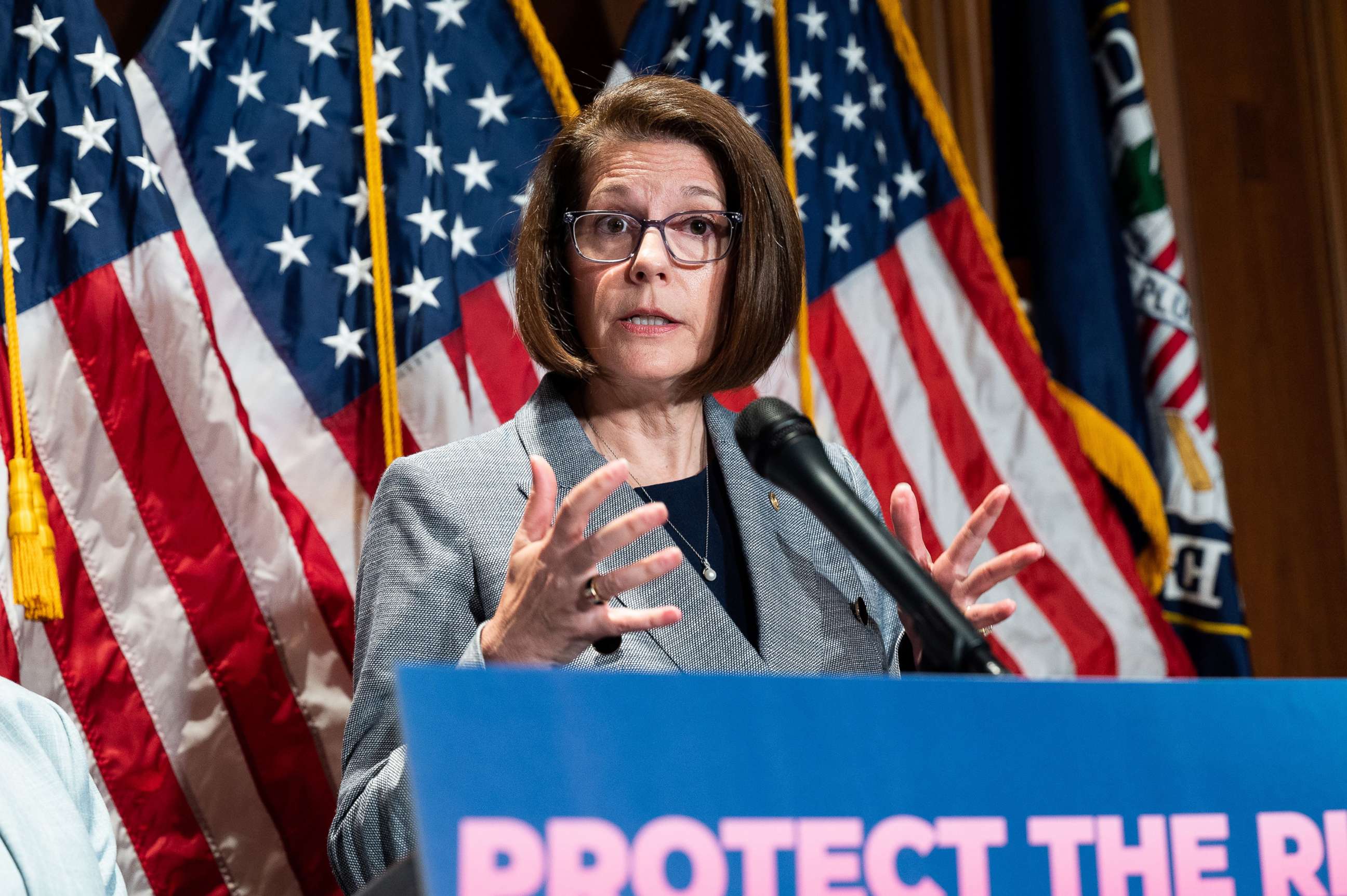
"To be very clear, no state has banned interstate travel for adult women seeking to obtain an abortion -- no state has done that," Lankford said. "Now am I confident there are some people that are out there talking, yes, but there are also in this Senate 5,000 bills that have been filed and how many of them are actually going to move?"
Indeed, some Republican-controlled states are already considering legislation that would bar women from traveling across state lines to receive an abortion. In Missouri, for example, legislation is being considered that would allow private citizens to sue anyone who assists a woman in traveling out of state to receive an abortion. Missouri is one of at least 13 states that have ceased nearly all abortion services.
Democrats warned that other states may soon consider proposals like the Missouri bill that aim to penalize women and those who help them travel across state lines.
"Anyone who tells you this is not a threat is either not paying attention or they are just trying to mislead you," said Murray, the top Democrat on the Senate health committee.
MORE: Man charged in rape of Ohio 10-year-old who police say later traveled across state lines for abortion
"We don't need to conjure up hypotheticals," Sen. Amy Klobuchar, D-Minn., said on the Senate floor on Thursday. "We already know what's happened."
Klobuchar cited recent reports of a 10-year-old girl in Ohio who had to travel to Indiana to receive an abortion after being impregnated by her rapist. (A suspect has been arrested in that case.)
"Should the next little 10-year-old's right or 12-year-old's right or 14-year-old's right to get the care that she desperately needs be put in jeopardy?" Klobuchar asked. "What about her mom? What about her doctor? Where will this end?"
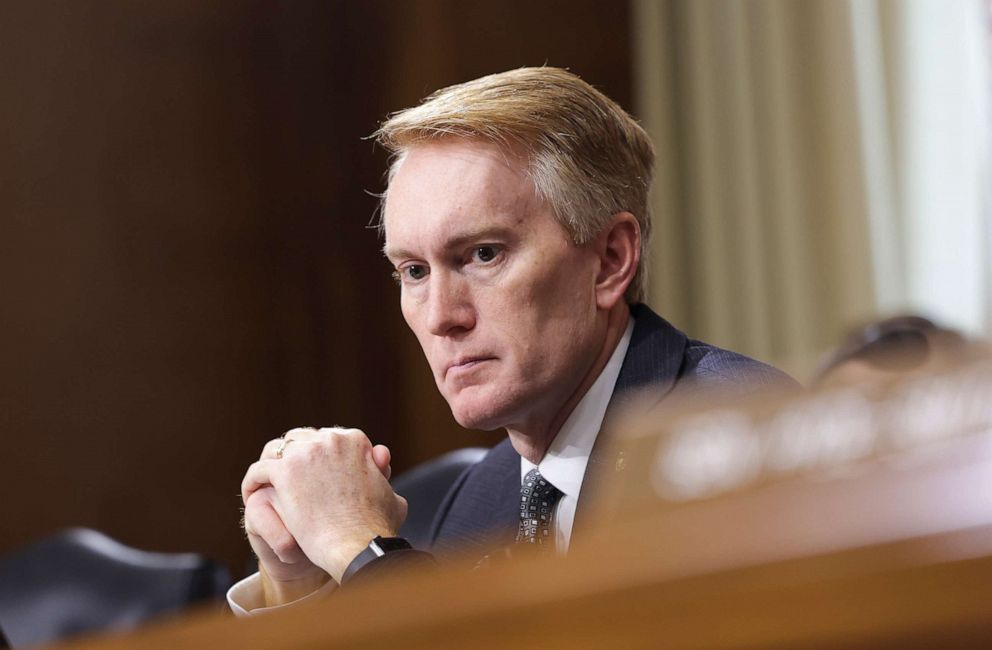
Colorado Democratic Sen. Michael Bennet spoke of his three daughters as he made a plea for the right-to-travel bill. He called near-total abortion bans being implemented in some states "literally crazy" but said some Republican lawmakers want to go further.
"I can't believe this is what we are handing over to the next generation of America, I cannot believe it, I cannot believe it," Bennet said. "This is despicable, especially coming from the same people who can never stop telling us how devoted they are to freedom and liberty."
Democrats knew their effort Thursday would fail, but they feel it had symbolic value for voters ahead of the crucial midterm elections -- as Democrats seek to underline the stakes of abortion access, and highlight GOP opposition, in the wake of the Supreme Court striking down Roe v. Wade last month.
Thursday's bill was part of a unified strategy among Democrats to have abortion-related votes up to Election Day, when -- they and some outside activists hope -- the issue may galvanize people to turn out at the ballot box to preserve their fragile majorities in Congress, despite other political headwinds like inflation.
When a draft of the eventual Supreme Court ruling that overturned Row leaked in May, Democrats attempted to pass the Women's Health Protection Act, which would have codified a women's right to choose and implemented a variety of other provisions to protect abortion access.
That effort was blocked unanimously by Republicans and by Sen. Joe Manchin, D-W.Va., who opposed the bill for going further than a basic codifying of Roe.
Related Topics
- Abortion Battle
Top Stories

Prince William shares 1st update on Kate Middleton, kids
- May 1, 9:37 AM

Justice Stephen Breyer's blunt message to Supreme Court conservatives: 'Slow down'
- May 1, 5:03 AM

14-year-old suspect dead after active shooter reported outside middle school: Sources
- 40 minutes ago

Pennsylvania father seeks answers after son dies following alleged game of tag

'Surprising' and 'disturbing': Legal experts react to SCOTUS on Trump immunity case
- Apr 30, 6:52 AM
ABC News Live
24/7 coverage of breaking news and live events

Senators on Right to Travel for Abortion Services
Senator Catherine Cortez Masto (D-NVV) asked for unanimous consent for the Senate to pass her bill to protect the right of women to travel t… read more
Senator Catherine Cortez Masto (D-NVV) asked for unanimous consent for the Senate to pass her bill to protect the right of women to travel to other states for abortion services, in response to the Supreme Court’s ruling overturning Roe v. Wade . Senator James Lankford (R-OK), who supports the Supreme Court’s decision, objected to her request. close
Javascript must be enabled in order to access C-SPAN videos.
- Text type Text Graphical Timeline
- Search this text
*This text was compiled from uncorrected Closed Captioning.
Hosting Organization
- U.S. Senate U.S. Senate
U.S. Senate
More videos from.
- Senate Session
- Senator Duckworth on Highland Park shootings
Democratic Senators on Right to Travel for Abortion Services
Airing details.
- Jul 15, 2022 | 1:25am EDT | C-SPAN 2
- Jul 15, 2022 | 7:36am EDT | C-SPAN 2
Related Video
Democratic Senators spoke on the chamber floor in opposition to the Supreme Court’s recent ruling to overturn Roe v. Wad …
Democratic senators spoke on the chamber floor in opposition to the Supreme Court’s recent ruling to overturn Roe v. Wad …
Senator Lankford on Abortion Rights Bill
Prior to a vote on a Democratic bill to protect abortion rights, Senator James Lankford (R-OK) spoke on the chamber floo…
"March for Life" March to Supreme Court
“Pro-Life” advocates marched to the Supreme Court in Washington, D.C.
User Created Clips from This Video
User Clip: Sen James Lankford on Right to Travel for Abortion Services

Mexico emerges as a destination for Americans seeking reproductive health services – not for the first time
W hen its six-week abortion ban went into effect on May 1, 2024, Florida joined nearly two dozen other U.S. states that ban abortion or greatly restrict it.
These laws came into effect after the Supreme Court’s 2022 decision to overturn Roe v. Wade ended nearly 50 years of the constitutional right to abortion in the United States.
Florida health officials in 2023 reported more than 84,000 abortions statewide, including nearly 7,800 from out-of-state residents.
The Tampa Bay Times recently reported that about 2 in 5 abortions in Florida over the past six years occurred in the first six weeks of pregnancy, meaning that roughly 60% of the procedures performed over that time frame would be illegal under the new restrictions.
The new laws in Florida and other states are sending some Americans across the border into Mexico to access an abortion, where the procedure was legalized in recent years.
Clinics in Mexico do not require proof of residency, so solid numbers about who they are treating are hard to come by. But providers in Mexico report they have been seeing more Americans.
In 2022, Luisa García, director of Profem , an abortion clinic in the border city of Tijuana, told NPR that the percentage of patients coming from the United States had jumped from 25% to 50% in just the two months following the Dobbs decision.
My research and teaching focuses on gender and sexuality in Latin America and the Caribbean. I often ask students to think about the differences between the United States and Latin America — and the struggles the two regions share .
Different paths
In recent years, the U.S. and Mexico have each struggled over access to abortion care, with the two countries moving in opposite directions.
The year before the U.S. Supreme Court reversed Roe, the Mexican Supreme Court ruled the criminalization of abortion by the northern state of Coahuila unconstitutional. This decision set a precedent that led to decriminalization at the federal level in 2023.
Change has since been slow. Only 13 of Mexico’s 31 states have modified their penal codes to reflect the court’s resolution, with Jalisco being the latest state to do so, in April 2024.
Unlike in the U.S., federal laws in Mexico do not automatically overrule local ones. But Mexican women living in states where abortions are illegal can still have one in a federally run hospital or clinic . And the federal statute protects the staff of those facilities from punishment.
Marea Verde movement
A crucial force behind the legalization of abortion care in Latin America is a movement called Green Tide, or Marea Verde , which emerged in Argentina and expanded across the region over the past two decades.
Although it began as a collective fight for abortion rights, Green Tide has grown to encompass issues such as the prevention of violence against women and members of the LGBTQ+ community, as well as femicide – the violent death of women motivated by gender .
Expansion of abortion access in Mexico
Following the U.S. Supreme Court’s decision in 2022, Mexican organizations offering abortions have expanded locations to increase choices for Mexican and U.S. residents seeking care. For example, Fundación MSI opened its newest clinic in Cancún late last year.
It chose this location intentionally , MSI’s Latin America regional managing director told the health news website Stat . Cancún’s status as a popular tourist destination means that multiple U.S. airports offer direct flights for about US$400 round trip . In-person abortion services range from $250 to $350. MSI’s website caters to Americans by offering information in English and featuring links to search for flights.
To assist those traveling to Mexico, Mexican and American abortion rights groups created the Red Transfronteriza , a transnational network that supports those crossing the border in search of care but whose primary mission has become the shipping of misoprostol and mifepristone, the pills generally used to induce abortions, into the United States.
One group that is part of the network on the Mexican side of the border is Guanajuato-based Las Libres, or The Free Ones. In September 2023, its founder estimated that her organization had sent abortion pills to approximately 20,000 women in the U.S. since the Dobbs decision.
Red Necesito Abortar , or I Need to Abort Network, was founded in 2017 by Sandra Cardona and Vanessa Jimenez in the northern city of Monterrey, Nuevo León, to help those seeking abortion services.
History of abortion, US-Mexico border
Although the Dobbs decision brought renewed attention to the issue, the relationship between the United States and Mexico and people from both countries seeking abortions has a long history.
Women’s studies professor Lina-María Murillo , who studies the U.S.-Mexico borderlands and teaches a course on global reproduction, explains that abortion in the United States was legal and performed by midwives before the Civil War. In the following decades, declining birth rates and gender inequality led to restrictions across the country and a nationwide ban in 1910 .
As Murillo’s research has documented, criminalization led women seeking abortions to travel to Mexico more than a century ago.
These border crossings ultimately declined as Mexican abortion restrictions were enforced and clinics shut down by the late 1960s. At the same time, U.S. activists and doctors contributed to the narrative that portrayed Mexico as a dangerous place where “back alley” abortions were performed by “butcher” physicians. Murillo argues that these myths contributed to a loosening of abortion restrictions in several U.S. states like California and New Mexico, helping set the stage for Roe v. Wade.
As elections loom closer in the United States, abortion will likely take center stage once again – including in Florida, where a referendum to reverse the six-week ban will be on the November ballot .
- What the Supreme Court is doing right in considering Trump’s immunity case
- Climate change is a fiscal disaster for local governments − our study shows how it’s testing communities in Florida
Alejandra Marquez Guajardo does not work for, consult, own shares in or receive funding from any company or organization that would benefit from this article, and has disclosed no relevant affiliations beyond their academic appointment.
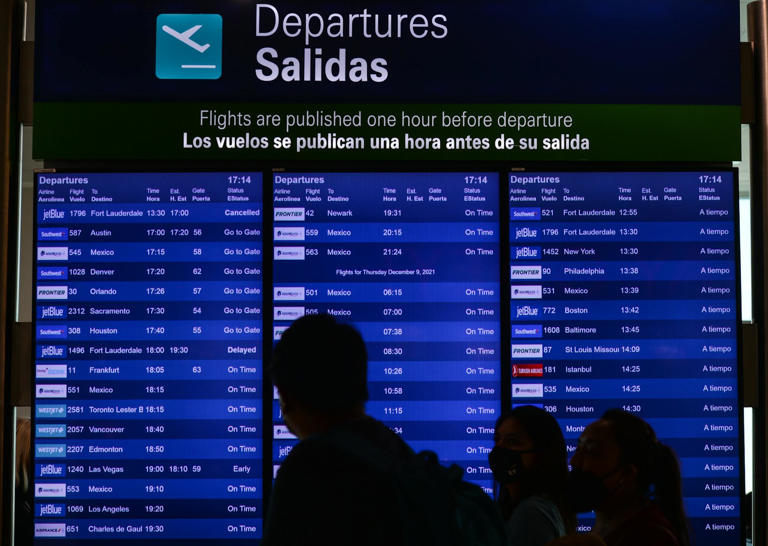
- Skip to main content
- Keyboard shortcuts for audio player
Abortion rights on the ballot may not be bad news for Republicans everywhere
Jason Rosenbaum

Voters take to the polls in the early hours of the morning on Tuesday, Nov. 8, 2022, during the 2022 Midterm Elections at Ladue City Hall in Ladue, Mo. Brian Munoz/St. Louis Public Radio hide caption
Voters take to the polls in the early hours of the morning on Tuesday, Nov. 8, 2022, during the 2022 Midterm Elections at Ladue City Hall in Ladue, Mo.
ST. LOUIS – Missouri may soon be a barometer for how abortion-related ballot initiatives can affect elections in Republican-led states.
If advocates and volunteers turn in enough signatures by May 5, Missourians will vote on an abortion-rights initiative in November.
Some Democrats in the state hope it energizes voters enough to help candidates running for key statewide and state legislative posts, but in some respects, having the ability to pick and choose policies through a robust initiative petition process could be a double-edged sword.
Voters in Missouri could show that abortion rights initiatives are not a down-ballot Democratic dream everywhere, especially if GOP voters who dislike their party's views on abortion rights still like candidates on most other issues.

Both sides prepare as Florida's six-week abortion ban is set to take effect Wednesday
Desiree White, a Missouri resident, says the state has the opportunity to break from widespread assumptions about its politics and voting habits.
White is a volunteer for Missourians for Constitutional Freedom , a group trying to repeal the state's ban on most abortions. As she helped gather the signatures needed to appear on the ballot, White says there's ample evidence that Missouri is not some "throwaway state" when it comes to abortion rights just because it tends to back GOP candidates.
"We're not too red," White says. "We long for our freedoms here in all aspects."
Public opinion may show the same. "We know from polling, and from results in other states, that there are a fair number of Republican voters who will vote Republican in other elections, but they don't agree with their party on abortion rights," says Kyle Kondik, who is with the University of Virginia-based Sabato's Crystal Ball. "They can place themselves on a spectrum of supporting abortion rights and say: 'Hey, maybe I even think that this ballot issue is too permissive. However, it's closer to my position than this current law in Missouri, which is among the most draconian in the country.' "
Missouri and split tickets

Bryan Pyle poses for a portrait in his home on Thursday, April 25, 2024, in Kirkwood, Mo. Pyle is conservative in his political views, but is against a ban on abortion. Eric Lee/St. Louis Public Radio hide caption
Bryan Pyle poses for a portrait in his home on Thursday, April 25, 2024, in Kirkwood, Mo. Pyle is conservative in his political views, but is against a ban on abortion.
St. Louis County resident Bryan Pyle may be a great example of the type of voter Kondik is talking about.
Pyle signed the Missourians for Constitutional Freedom ballot initiative, which would allow abortion up to what's known as fetal viability. That's defined in the initiative as a point when a medical professional determines a fetus could survive outside of the womb without extraordinary medical intervention.
"We don't need to have people take the rights from other people because they don't like it," Pyle says. "And we should all have the right to make our own decisions."
But Pyle, who voted for Republican candidates in 2016 and 2020, expects to vote for the GOP in 2024. That corresponds with recent polling from Saint Louis University and YouGov showing that 24% of Republican respondents would vote for the Missourians for Constitutional Freedom initiative. That same survey shows a Republican winning the governor's race without too much trouble.

Biden is campaigning in Florida a week before a new abortion ban takes effect
"The best bet that Republicans have in the state is that they get the voters to put their 'red jerseys' on and look at the abortion rights issue as a kind of partisan issue," Kondik says. "But again, my guess is there'll be a significant number of voters who don't do that. And you can imagine it passing even in the midst of an otherwise Republican environment."
Split ticket voting behavior is common in Missouri, where Republicans control all statewide offices and both U.S. Senate seats but thanks to an initiative petition process allowing groups to circumvent the legislature, Missourians have enacted fairly left-of-center policies expanding Medicaid and raising the minimum wage. They also legalized marijuana for adult use and instituted campaign donations.
Some of those results stem from underfunded opposition campaigns. Still, others say it's part of a broader trend allowing voters to back policies that may depart from their chosen candidates' political orthodoxy.
"You're asking voters a single question," says pollster Christine Matthews, who runs Virginia-based Bellwether Research and Consulting. "And they're only considering the abortion issue. When you're looking at a candidate, you're looking at them with a whole lot of different positions and needs and frames in mind."
Republicans aren't fearful of blowback
For their part, GOP candidates in Missouri aren't too worried about abortion rights upending their bids for office in 2024.
U.S. Sen. Josh Hawley, for instance, says he welcomes Missourians deciding for themselves whether to legalize abortion or keep the ban in place. Hawley opposes abortion rights except in cases of rape, incest or the life of the mother. That's out of step with Missouri's law, which doesn't have exceptions for rape or incest.

Democratic Missouri state Representative Ashley Aune, poses for a portrait on Thursday, Jan. 25, 2024, at the state Capitol in Jefferson City. Eric Lee/St. Louis Public Radio hide caption
Democratic Missouri state Representative Ashley Aune, poses for a portrait on Thursday, Jan. 25, 2024, at the state Capitol in Jefferson City.
"My whole adult life I said Roe is wrong because the Constitution gives us the choice of the people," Hawley said earlier this year. "My view is, you gotta let the people decide. So if the people want to vote on this, we should vote on it. We can vote on it every year if they want to."
The three major Republican candidates seeking to succeed Missouri Gov. Mike Parson aren't worried they'll suffer electoral blowback either — even if the abortion initiative goes before voters in November.
Lt. Gov. Mike Kehoe says it's possible that the initiative could motivate socially conservative voters — especially in rural counties and conservative suburbs where the GOP gained ground in the past decade.

Shots - Health News
What's at stake as the supreme court hears idaho case about abortion in emergencies.
"Even if there's Missourians who say there might be some medical exceptions or exceptions for rape or incest, I think if they knew how far it allows it to go — it would give them pause," Kehoe says.
Still, recent history shows that abortion rights can impact down-ballot elections. Back in 2012, then-U.S. Sen. Claire McCaskill won a resounding reelection victory over GOP opponent former U.S. Rep. Todd Akin. Akin set off a national firestorm after he said on a local television program, "If it's a legitimate rape, the female body has ways to try to shut that whole thing down."
Even current GOP candidates, such as gubernatorial hopeful Jay Ashcroft, Missouri's secretary of state, say they don't think the effect of an abortion rights initiative will be nonexistent on other contests. He says it's possible that it could affect state legislative contests, especially in suburban districts where the two parties are more evenly divided.
"Maybe there's certain suburban districts, those kind of 50/50 House districts, or one or two state Senate districts, where maybe that changes the electorate enough to change who gets elected," says Ashcroft.
And Democrats like Lucas Kunce, one of the Democrats running against Sen. Hawley, say the reason to get the abortion rights ballot item up to Missouri voters has less to do with the political impact and more about overturning what he sees as a cruel and overreaching ban.
"The importance of that is not my race, it's the importance of giving women access to the health care that they need," Kunce says. "It is about taking care of everyday Missourians and taking away the weird control that our politicians want to have over women and giving them the ability to make their own decisions."
Ballot items in limbo?

Missouri state Senator Bill Eigel, a Republican, gestures as he debates with Republican Missouri Senate Floor Leader Cindy O'Laughlin, not pictured, during session on Thursday, Jan. 25, 2024, in Jefferson City. Eric Lee/St. Louis Public Radio hide caption
Missouri state Senator Bill Eigel, a Republican, gestures as he debates with Republican Missouri Senate Floor Leader Cindy O'Laughlin, not pictured, during session on Thursday, Jan. 25, 2024, in Jefferson City.
Unlike other states such as Wisconsin, Missouri's robust initiative petition process makes legalizing abortion possible, but that may change.
Missouri lawmakers have been trying to place another ballot item, presumably on the August ballot, that would raise the threshold to amend the state's constitution . Some lawmakers also want to place other items into the initiative, such as a measure barring noncitizens from voting.
"Folks are rightfully looking for Republicans in the legislature to lead on this issue and protect the constitution," says Missouri Sen. Bill Eigel, who like Kehoe and Ashcroft, is running for governor.
Democrats have decried the other items in the initiative petition overhaul as "ballot candy" meant to confuse voters from the real purpose: making it nearly impossible for organizations to place ballot items up for a vote.
"The voters are not going to be fooled by this effort," says Democratic state Rep. Ashley Aune, noting a similar effort fell flat in Ohio . "What they're trying to do is essentially to end majority rule."
Sen. John Rizzo, the Democratic leader of the Missouri Senate, says he's tried to warn his Republican colleagues that a successful effort to gut the initiative petition process could backfire on the GOP.
He says giving people the right to pick policies different from the candidates they ultimately vote for may help Republicans in the long run.
"That's the thing that allows them to go around the legislature," Rizzo says. "And if they can't do that, and they can't go around the legislature, they're gonna start changing the legislature."
Missouri abortion initiative gets big-name support

Karlie Kloss, right, speaks to a volunteer for Missourians for Constitutional Freedom, a group attempting to legalize abortion in the state, on Monday, April 1, 2024, at Congregation Shaare Emeth in Creve Coeur, Mo. Brian Munoz/St. Louis Public Radio hide caption
Karlie Kloss, right, speaks to a volunteer for Missourians for Constitutional Freedom, a group attempting to legalize abortion in the state, on Monday, April 1, 2024, at Congregation Shaare Emeth in Creve Coeur, Mo.
Missourians for Constitutional Freedom are slated to turn in their signatures by May 5. In addition to getting thousands of volunteer signature gatherers and millions of dollars in campaign donations, the campaign also received support from fashion icon Karlie Kloss.
Kloss was in the St. Louis area earlier this month to gather signatures for the abortion initiative. Like other volunteers, she noticed that a good share of people who wanted to sign the petition were Republicans who disagreed with their party on the right to a legal abortion.
"It's no secret that there's an enormous amount of bipartisan support," Kloss said earlier this month in an interview with St. Louis Public Radio. "Many signatures and people showing up here today and organizing this effort are Republicans — as well as Democrats."
Kloss, who grew up in the St. Louis suburb of Webster Groves, said the rest of the country should pay attention to what's happening in Missouri — and not just for political implications. The lack of abortion access is causing stress on smaller health care facilities, especially in Illinois where the procedure is legal. That's one of the reasons she started a group called the Gateway Coalition to support those facilities.
"It's devastating to me the reality of what is happening and how it has become so politicized," Kloss said. "Because to me, this is a conversation that belongs between an individual and their physician, and an individual and their loved ones. Politicians should not be involved."
Missourians should know sometime over the summer if they're going to vote to legalize abortion.
"To me, this issue is about dignity," Kloss said.
Tears and despair at Florida abortion clinic in final hours before ban
A fort lauderdale-area clinic saw patients for extended hours — and turned some away — as the state prepared for a six-week abortion ban to take effect may 1..

BROWARD COUNTY, Fla. — When she walked into the abortion clinic Tuesday morning, Kristen thought she’d made it just in time.
The 22-year-old mother of two had learned just a few hours earlier that a new six-week abortion ban would go into effect in Florida on Wednesday. So she canceled all her plans and found someone to drive her, in hopes of ending her pregnancy before the deadline.
She was one day too late.
“We did an ultrasound and you’re over the state limit,” said Eileen Diamond, the director of Benjamin Surgical Services International, gently explaining to Kristen that the test showed she was eight weeks pregnant.
While the clinic could still provide abortions for women more than six weeks into their pregnancies until midnight, Diamond said, another Florida law requires all abortion patients to have an ultrasound at least 24 hours before their procedure. That meant the earliest Kristen could get an abortion was Wednesday, when her abortion would no longer be legal.
“Oh no,” Kristen said, tears rolling down her cheeks as she sat across a desk from Diamond in a consultation room. “No. No.”
As of Wednesday morning, clinics across the country’s third-largest state can no longer offer abortions to most patients who walk through their doors — forced to turn away any woman who is further than six weeks along, a point when many still don’t know they’re pregnant. The enactment of Florida’s new ban on May 1 is widely expected to be the biggest jolt to abortion access across the country since Roe v. Wade was overturned in 2022.
For Kristen, the nearest abortion clinic that will be able to help her is now an 11-hour drive away in North Carolina.
“I can help you find an appointment in another state, but you would have to get there,” Diamond told her Tuesday.
Kristen shook her head. Then she looked at Diamond and laughed: With her financial situation, Diamond might as well have been suggesting she fly to the moon.
“I can’t afford three kids,” said Kristen, who like other women in this story spoke on the condition that only their first names be disclosed to protect their privacy. “But I’m not going out of state. I can’t afford to go out of state.”
Florida’s new abortion law, signed by Gov. Ron DeSantis (R) last year and confirmed by the Florida Supreme Court last month, replaces a 15-week ban that took effect soon after Roe fell. It will affect significantly more women than any other state ban on abortions in the first trimester. More than 80,000 women get an abortion in Florida in a typical year, accounting for about 1 in 12 abortions nationwide.
For every Florida woman with an unwanted pregnancy, the future will now be determined by the size of the fetus on the ultrasound screen. If it’s small enough to measure under the six-week limit, she can have the abortion. If not, she’ll either have to order abortion pills online or travel to a clinic at least three states away.
“I feel so violated,” Ilona, 42, said through tears Tuesday afternoon, after she, too, was turned away for an abortion at Benjamin Surgical Services International. “I feel like this should be my right. It should not be so hard.”
A ban of this magnitude will immediately upend abortion access far beyond Florida’s borders, with Floridians traveling to North Carolina, Illinois and Virginia, where clinics are already struggling to absorb patients from antiabortion states across the Southeast. And while abortion rights advocates are hoping voters will approve a measure in November that would lift the ban in January — restoring abortion access in Florida until roughly 24 weeks of pregnancy — tens of thousands of women will be affected between now and the new year, regardless of what happens in the election.
At Benjamin Surgical Services International, clinic staff members tried to squeeze in as many patients as possible ahead of the new law taking effect — seeing twice as many patients over the last few days and staying open long after they usually close their doors. They would perform their last abortion for a patient beyond six weeks at 4:50 p.m. on Tuesday.
Benjamin Surgical Services has been operating for 36 years. Its founder, Michael Benjamin, is a well-known OB/GYN and abortion provider in South Florida, who started performing abortions in 1973, the year Roe was decided.
Where is abortion legal and illegal?

For the last week, Diamond had been frantically calling patients who had missed their appointments. After nearly three decades working in abortion care, Diamond said she knows how it goes: Patients get busy. Their rides bail. They need a little more time to come up with the money.
Except on Tuesday, there was no more time. They had to get here now.
“It’s very important that you come in as soon as possible,” Diamond repeated again and again as she answered the phones Tuesday morning. “Is there any way you can come in today?”
She was particularly worried about Dawn, a woman who texted Diamond late Monday night. Already 12 weeks pregnant, Dawn had been to the clinic once for an ultrasound — but she wasn’t on the schedule for Tuesday. She could only come up with a fraction of the cost of the abortion.
“Hello, please if there is anything I can do to have this abortion I’m desperately in need of, I will do anything possible,” Dawn, 32, texted Diamond at 11:32 p.m. “This is very urgent that I don’t have another baby.... I just need your help. Please please please help.”
Dawn said in an interview that she’d spent most of Monday night crying — imagining her life if she had to have another child. She lived in a one-bedroom apartment with her four children, including a 5-month-old. She’d just broken up with her partner. Her family’s living situation was so dire, she said, that she’d started looking into shelters where they could stay.
When Dawn arrived at the clinic Tuesday morning, Diamond called her in for a consultation.
“You can have the procedure today,” Diamond said. The clinic would find funds to cover the abortion.
Dawn immediately broke down in tears.
“It’s a life-or-death situation for me,” she said. “Thank you so much.”
By noon Tuesday, almost every seat in the clinic’s waiting room was filled, with a dozen more women waiting outside in the hallway. Some came alone, others with babies or boyfriends. They waited patiently for hours, scrolling on Instagram and TikTok — understanding that everyone was in the same situation, trying to end their pregnancies by May 1.
Several women who came to the clinic Tuesday would not feel the same sense of relief as Dawn by the end of the day. At least six patients who came in for their initial ultrasound appointments were told the procedure showed they were too far along to get an abortion in the state of Florida.
“So I have no choice but to keep it, right?” said one 35-year-old mother of three.
Diamond immediately shifted into problem-solving mode, as she’d done with the others who’d received similar news. There were direct flights from Fort Lauderdale to Washington, D.C., she said. A clinic in the nation’s capital could see them immediately — and, at least for now, abortion rights organizations were willing and able to foot the bill.
“Go home, think about it,” Diamond said to Kristen, the 22-year-old who found out she was beyond the six-week limit Tuesday morning. “I’m going to take a picture of the flights I’m suggesting — and if you decide for me to do it, I’ll buy the flights.”
“This is a service that people who believe in access to abortion care are doing for women,” she added.
Diamond has been working with abortion funds in Florida and across the country, as well as a handful of out-of-state clinics that she trusts. Several of her staff members recently visited a clinic in D.C. to establish a relationship and make sure it’s a place they feel good about sending people.
“Please keep your doors open for us, because we are going to be sending you a lot of patients,” Diamond said on a call with a D.C. clinic Tuesday.
But leaving the state is not a solution for everyone, even if the trips are fully funded. Most of the women Diamond spoke to Tuesday were wary of her proposal. Who would look after their children while they were gone, they wanted to know? What if they had a pregnancy complication on the plane?
Ilona said she hemorrhaged severely after a previous Caesarean section. She was terrified of bleeding out in the air.
“I almost died,” she said. “And now they’re forcing women to travel in these unsafe situations.”
Diamond and other staff members at the clinic took every opportunity to remind women that they would soon have some power over these laws: If the women were angry, they told them, they had to vote in November.
“If we just have one person affected who can then translate this message to 10 people she knows … hopefully 60 percent of Floridians will see the light,” said Kurt Christopher, one of the doctors at the clinic, referring to the 60-percent threshold needed to enshrine abortion rights in Florida’s constitution.
The faint promise of a ballot initiative meant little to the women denied abortion care.
Shouldn’t there be a little wiggle room, asked Ilona, who was turned away after the ultrasound she was required to get 24 hours before an abortion showed she was nearly 12 weeks pregnant.
What difference did a few hours make?
“Just do it,” she pleaded.
Diamond had to send her home.
U.S. abortion access, reproductive rights
Tracking abortion access in the United States: Since the Supreme Court struck down Roe v. Wade , the legality of abortion has been left to individual states. The Washington Post is tracking states where abortion is legal, banned or under threat.
Abortion and the election: Voters in about a dozen states could decide the fate of abortion rights with constitutional amendments on the ballot in a pivotal election year. Biden supports legal access to abortion , and he has encouraged Congress to pass a law that would codify abortion rights nationwide. After months of mixed signals about his position, Trump said the issue should be left to states . Here’s how Biden and Trump’s abortion stances have shifted over the years.
New study: The number of women using abortion pills to end their pregnancies on their own without the direct involvement of a U.S.-based medical provider rose sharply in the months after the Supreme Court eliminated a constitutional right to abortion , according to new research.
Abortion pills: The Supreme Court seemed unlikely to limit access to the abortion pill mifepristone . Here’s what’s at stake in the case and some key moments from oral arguments . For now, full access to mifepristone will remain in place . Here’s how mifepristone is used and where you can legally access the abortion pill .
- States where abortion is on the ballot in the 2024 election April 15, 2024 States where abortion is on the ballot in the 2024 election April 15, 2024
- States where abortion is legal, banned or under threat Earlier today States where abortion is legal, banned or under threat Earlier today
- Tears and despair at Florida abortion clinic in final hours before ban Earlier today Tears and despair at Florida abortion clinic in final hours before ban Earlier today

- Election 2024
- Entertainment
- Newsletters
- Photography
- Personal Finance
- AP Investigations
- AP Buyline Personal Finance
- AP Buyline Shopping
- Press Releases
- Israel-Hamas War
- Russia-Ukraine War
- Global elections
- Asia Pacific
- Latin America
- Middle East
- Election Results
- Delegate Tracker
- AP & Elections
- Auto Racing
- 2024 Paris Olympic Games
- Movie reviews
- Book reviews
- Personal finance
- Financial Markets
- Business Highlights
- Financial wellness
- Artificial Intelligence
- Social Media
Arizona’s Democratic leaders get enough votes to repeal 19th century abortion ban
FILE - Pro-life demonstrators walk in the front of the Arizona Capitol prior to the vote on the proposed repeal of the state’s near-total ban on abortions prior to winning approval from the state House on, April 24, 2024, in Phoenix. Democrats at the Arizona Legislature are expected to make a final push Wednesday, May 1, to repeal the state’s long-dormant ban on nearly all abortions that a court said can be enforced. (AP Photo/Ross D. Franklin, File)
FILE - The Arizona Senate building at the state Capitol stands, April 11, 2024, in Phoenix. Democrats at the Arizona Legislature are expected to make a final push Wednesday, May 1, to repeal the state’s long-dormant ban on nearly all abortions that a court said can be enforced. (AP Photo/Ross D. Franklin, File)
- Copy Link copied
PHOENIX (AP) — Democrats secured enough votes in the Arizona Senate on Wednesday to repeal a Civil War-era ban on abortions that the state’s highest court recently allowed to take effect.
Voting wasn’t complete but the Senate had the 16 votes it needed to advance the bill.
Fourteen Democrats in the Senate were joined by two Republican votes in favor of repealing the bill, which narrowly cleared the Arizona House last week and is expected to be signed by Democratic Gov. Katie Hobbs.
The near-total ban, which predates Arizona’s statehood, permits abortions only to save the patient’s life — and provides no exceptions for survivors of rape or incest. In a ruling last month, the Arizona Supreme Court suggested doctors could be prosecuted under the 1864 law, which says that anyone who assists in an abortion can be sentenced to two to five years in prison.
If the repeal bill is signed, a 2022 statute banning the procedure after 15 weeks of pregnancy would become Arizona’s prevailing abortion law. Still, there would likely be a period when nearly all abortions would be outlawed, because the repeal won’t take effect until 90 days after the end of the legislative session, likely in June or July.
Several senators spoke about their motivations for voting as numbers were tallied on the repeal bill.
“This is a clear statement that the Legislature does not want the territorial ban to be enforceable,” said Democratic state Sen. Priya Sundareshan, who voted yes to repeal.
Arizona state Attorney General Kris Mayes called the vote “a win for freedom in our state,” but expressed concern that without an emergency clause, Arizonans would still be subject to the near total-abortion ban for some time.
“Rest assured, my office is exploring every option available to prevent this outrageous 160-year-old law from ever taking effect,” she said.
There were numerous disruptions from people in Senate gallery, as Republican state Sen. Shawnna Bolick explained her vote in favor of repeal, joining with Democrats.
GOP state Sen. Jake Hoffman denounced Republican colleagues for joining with Democratic colleagues, calling it an affront to his party’s principles.
“It is disgusting that this is the state of the Republican Party today,” Hoffman said.
Advocates on both sides of the abortion issue arrived outside the Arizona Senate on Wednesday to emphasize their views. They included people affiliated with Planned Parenthood and faith-based groups opposed to abortion.
A school-age girl kneeled in prayer in front of a table holding a large statute of the Virgin Mary, while a man with a megaphone shouted at passersby to repent.
“I am expecting it will be repealed, but I am praying it won’t be,” said Karen Frigon, who was handing out brochures from the Arizona Right to Life.
Arizona is one of a handful of battleground states that will decide the next president. Former President Donald Trump, who has warned that the issue could lead to Republican losses, has avoided endorsing a national abortion ban but said he’s proud to have appointed the Supreme Court justices who allowed states to outlaw it.
The law had been blocked since the U.S. Supreme Court’s 1973 Roe v. Wade decision guaranteed the constitutional right to an abortion nationwide.
When Roe v. Wade was overturned in June 2022 though, then-Arizona Attorney General Mark Brnovich, a Republican, persuaded a state judge that the 1864 ban could again be enforced . Still, the law hasn’t actually been enforced while the case was making its way through the courts. Mayes, who succeeded Brnovich, urged the state’s high court against reviving the law.
Planned Parenthood officials vowed to continue providing abortions for the short time they are still legal and said they will reinforce networks that help patients travel out of state to places like New Mexico and California to access abortion.
Advocates are collecting signatures for a ballot measure allowing abortions until a fetus could survive outside the womb, typically around 24 weeks, with exceptions — to save the parent’s life, or to protect her physical or mental health.
Republican lawmakers, in turn, are considering putting one or more competing abortion proposals on the November ballot.
A leaked planning document outlined the approaches being considered by House Republicans, such as codifying existing abortion regulations, proposing a 14-week ban that would be “disguised as a 15-week law” because it would allow abortions until the beginning of the 15th week, and a measure that would prohibit abortions after six weeks of pregnancy, before many people know they’re pregnant.
House Republicans have not yet publicly released any such proposed ballot measures.

IMAGES
COMMENTS
July 15 (Reuters) - The U.S. House of Representatives on Friday passed legislation to safeguard the right to travel across state lines to seek an abortion after several states banned the procedure ...
Just last week, hundreds of abortion rights activists protested outside the White House calling on President Joe Biden to do more to ensure abortion rights. Biden signed an executive order on July ...
One of the bills could codify the right to abortion and the other would ban punishing those who travel out of state for reproductive health care, but Republicans in the Senate oppose the measures.
The House is poised to vote Friday on a similar bill, sponsored by Rep. Lizzie Fletcher, D-Texas, that would protect interstate travel for women seeking abortions where they are legal.
any person or entity who helps another person travel to another state to obtain such services, or; the movement in interstate commerce of drugs that are approved to terminate pregnancies. The Department of Justice may enforce this bill through civil actions; the bill also establishes a private right of action for violations.
The House on Friday passed a bill to protect people who travel out-of-state to access abortion care in a 223-205 vote, following last month's Supreme Court decision overturning Roe v. Wade. Driving the news: House lawmakers also passed a bill that codifies abortion protections that used to be guaranteed by Roe into federal law.
Another bill would reinstate a nationwide right to an abortion, rejecting a U.S. Supreme Court ruling in June that overturned the landmark Roe v. Wade decision. The bill to protect patients' rights to travel for abortion services passed 223-205, with 220 Democrats and three Republicans voting in favor. The Republicans were Brian Fitzpatrick ...
President Joe Biden speaks at the White House in Washington, on Friday, June 24. (Andrew Harnik/AP) President Biden said his administration will protect the "bedrock right" of women to travel from ...
One measure, which passed mainly along party lines, 222 to 205, would protect the right to travel across state lines for abortion services, with three Republicans joining Democrats in support of ...
Twenty-one states ban abortion or restrict the procedure earlier in pregnancy than the standard set by Roe v. Wade, which governed reproductive rights for nearly half a century until the Supreme ...
The House passed the Ensuring Access to Abortion Act in a 223-205 vote, which bars states from prohibiting people from getting or aiding an out-of-state abortion, assuming abortion is legal in the ...
July 11, 2022. WASHINGTON — Democrats in Congress, under pressure to take quick action in response to the Supreme Court's decision striking down abortion rights, are planning to hold votes ...
Even if every Democrat voted for the bill — a big if, given Sen. Joe Manchin 's (D-W.Va.) vote against Democrats' more sweeping abortion-rights bill in May — the bill may fail to pick up ...
One measure, which passed mainly along party lines, 222 to 205, would protect the right to travel across state lines for abortion services, with three Republicans joining Democrats in support of ...
Today, Congresswoman Lizzie Fletcher (TX-07) announced that the House of Representatives will vote on her bill to protect the right to travel for abortion, the Ensuring Women's Right to Reproductive Freedom Act, H.R. 8297, on Friday, July 15.This morning, the House voted in favor of bringing the bill to the House floor after it received overwhelming support with more than 165 co-sponsors and ...
The Justice Department filed a statement of interest today in two consolidated lawsuits seeking to protect the right to interstate travel, including the right to travel to another state to obtain an abortion that is legal in the destination state. The statement of interest explains that the Constitution protects the right to travel across state lines and engage in conduct that is lawful where ...
The U.S. Department of Justice on Thursday backed the right of people to travel across state lines to receive an abortion, supporting two lawsuits brought by healthcare organizations and abortion ...
House Speaker Nancy Pelosi (D-Calif.) leads fellow Democratic congresswomen to highlight their upcoming vote on the Women's Health Protection Act and the Ensuring Women's Right to Reproductive ...
As of Wednesday, May 1, most abortions in Florida after six weeks will be illegal. The state's previous 15-week ban passed in 2022 went into effect a month ago, when the state Supreme Court ...
The order will facilitate out of state travel for abortion to parts of the country where the procedure is still legal. The move comes amid Republican-led attempts to outlaw abortion following the ...
The right to travel is generally seen as protected by the Fourteenth Amendment, and this has been upheld by the Supreme Court in the past. However, the right to an abortion was also seen as ...
Nearly two years after the Supreme Court overturned Roe v. Wade and the constitutional right to choose, millions of Americans are living under extreme state abortion bans. These dangerous laws are ...
Senate Republicans on Thursday blocked a bill that would have both legally shielded the people who travel across states lines to receive an abortion and the providers who care for those patients ...
Senator Catherine Cortez Masto (D-NVV) asked for unanimous consent for the Senate to pass her bill to protect the right of women to travel to other states for abortion services, in response to the ...
These laws came into effect after the Supreme Court's 2022 decision to overturn Roe v. Wade ended nearly 50 years of the constitutional right to abortion in the United States.. Florida health ...
More states than ever are gearing up to vote on abortion rights this fall, including Republican-led Missouri. There, voters could show the issue isn't a down-ballot Democratic dream everywhere.
TAMPA, Fla. — President Biden traveled to Florida on Tuesday to denounce that state's six-week abortion ban — just days before the law goes into effect — blaming former president Donald ...
Florida's new abortion law, signed by Gov. Ron DeSantis (R) last year and confirmed by the Florida Supreme Court last month, replaces a 15-week ban that took effect soon after Roe fell. It will ...
"FIGHT FOR REPRODUCTIVE FREEDOM": Vice President Kamala Harris is speaking in Jacksonville on the day Florida's 6-week abortion ban takes effect....
PHOENIX (AP) — Democrats in the Arizona Legislature are expected to make a final push Wednesday to repeal the state's long-dormant ban on nearly all abortions, which a court said can be enforced.. Fourteen Democrats in the Senate are hoping to pick up at least two Republican votes to win final approval of the repeal bill, which narrowly cleared the Arizona House last week and is expected ...